Report of the Office of the Vice-Chancellor
2024

Report of the Office of the Vice-Chancellor
2024
VISION, MISSION AND VALUES
VISION
CPUT is Africa’s leading Smart University of Technology, globally renowned for innovation, with graduates that shape a better world for humanity
VALUES
CPUT agrees to oneness and smartness by:
• Embracing a culture of Ethics and Integrity;
MISSION

CPUT transforms its students, through world class researchers who inspire knowledge production and innovation that are cutting edge
• Seeking Kindness and showing compassion (human heartedness) for the well-being of all our students, staff, stakeholders and the CPUT community, as expressed in ubuntu as a way of living;
• Embracing Restoration as we deal with the legacy of our past and as we redress issues of equality, gender-based violence, and any form of discrimination;
• Being a testimony of Unity (ubunye), whilst embracing diversity (ukungafani) in all its forms by being honest, transparent, credible and respectful;
• Showing Passion and demonstrating enthusiasm, devotion, intensity, tenacity and total commitment to everything that we undertake as a university of technology; delivering uncompromising quality service, and always searching for better ways of doing things;
• Taking Accountability and accepting responsibility for all our actions and the actions that we commit to; and
• Being Technologically Astute and understanding, as staff members or students of CPUT who aspire to become technologically astute, that we will embrace and take ownership of and experiment with the possibilities technology offers. These attributes facilitate the novel application of modern technology, enabling the enhancement of productivity and efficiency, whilst always focusing on innovation that is centred on a better world.


Foreword by the Vice-Chancellor
As we navigate the dynamic landscape of higher education, the importance of robust governance and comprehensive assurance mechanisms cannot be overstated. At the Cape Peninsula University of Technology (CPUT), our commitment to excellence is reflected in the diverse activities and functions that report to my Office. These functions, namely quality management, academic planning, internal audit, compliance, business continuity, transformation, marketing and communication, stakeholder engagement, and risk management, are pivotal in fostering an environment that meets and exceeds our stakeholders’ expectations.
Quality management ensures that our academic offerings are relevant and of the highest standards, facilitating a transformative educational experience for our students. Through meticulous academic planning, we align our curricula with industry needs, preparing our graduates to thrive in a competitive job market. Internal audit and compliance work together to ensure our processes are transparent and accountable, reinforcing CPUT’s commitment to integrity and ethical governance.
Business continuity planning is critical in today’s unpredictable environment, enabling us to sustain operations and safeguard our community’s well-being. At the same time, transformation initiatives aim to create an inclusive and equitable academic culture. Our marketing and communication strategies effectively articulate our vision and achievements, enhancing our reputation, and attracting a diverse student body.
Vice-Chancellor: CPUT
Stakeholder engagement is at the heart of our operations, establishing meaningful relationships that drive collaboration and innovation. Furthermore, a proactive approach to risk management identifies potential challenges, allowing us to mitigate them effectively, and ensure the resilience of our institution.
Together, these functions lay a strong governance foundation that supports our collective ambition of achieving Vision 2030. By integrating our efforts, we strive to position CPUT as the Massachusetts Institute of Technology (MIT) of Africa, a beacon of innovation and excellence in higher education.

Prof Chris Nhlapo Vice-Chancellor
Message from the Executive Director: Office of the Vice-Chancellor
In reflecting on our recent achievements, I would like to take a moment to sincerely thank you for the outstanding work you have all contributed across the various functions under the Vice-Chancellor’s Office.
Your steadfast dedication to delivering exceptional work, showcasing a robust work ethic, and fostering innovation, has been recognised. Submitting statutory reports on time, and managing your responsibilities accurately are essential for our shared success and CPUT’s reputation. Your commitment guarantees that we not only fulfill compliance obligations, but also maintain the highest standards of excellence.
I encourage each of you to continue your journey of learning and professional development. Pursuing knowledge is fundamental in our ever-evolving higher education landscape, and investing in your growth will benefit you and our institution. Let us remain curious, seek new opportunities, and cultivate our skills to enhance our contributions to CPUT.
Thank you once again for your hard work, resilience, and passion. Together, we are building a solid foundation for our future, and driving CPUT towards achieving its vision.

Prof Driekie Hay-Swemmer
Executive Director: Office of the Vice-Chancellor

Calvin Maseko Director: Advancement
Advancement Directorate
The Vice-Chancellor’s Prestigious Achievers Award Programme continues to build the next generation of academics and researchers.
When this Programme was first launched in October 2018, the only beneficiary was Zamavangeli Mdletshe. In April 2023, Dr Mdletshe earned her PhD in Mechanical Engineering. She is among the ten graduates of the Programme (five doctoral and five master’s graduates).
Since then, the number of Prestigious Achievers Awardees has increased from one to 25, including 20 (80%) females, and five (20%) male students. This reflects a genuine dedication to the country’s transformation agenda, as supporting more female students demonstrates real commitment. Along with the 21 Prestigious Achievers Awardees, the Programme has offered additional financial assistance for tuition fees to 24 master’s and doctoral candidates.
Since its launch, R5.1 million has been spent through the Programme. The Mauerberger Foundation Fund funded R4 million, and CPUT, through the Advancement Department, contributed R1.1 million.
The Programme has a 77% completion rate, which is extremely high for master’s and doctoral studies, compared to the completion rates of these levels when analysing higher education sector trends nationwide. This success will offer more significant assistance to beneficiaries expected to complete their studies by December 2024 and April 2025, raising the completion rate to around 90%. The impressive completion rate highlights the prestige and significance of this Programme. It serves as a remarkable example of postgraduate achievement. Of the 11 graduates, five are now employed.
CPUT secures second Lecturer Development Programme funding from MQA
With support from the Mining Qualifications Authority (MQA), Advancement and the Faculty of Engineering and the Built Environment (FEBE) initiated a Lecturer Development Programme in January 2024. The first project allocated R15 million to develop six lecturers over the next three years at CPUT. Additionally, CPUT introduced another project, raising the number of lecturer candidates from six to nine, backed by an extra R3 million in funding.
The University has recruited six South African nationals who receive support in finishing their master’s and doctorate degrees. They also benefit from financial aid to register as engineering professionals with the Engineering Council of South Africa (ECSA), and to attend national and international conferences to present papers. MQA fully covers the nine candidates’ salaries and development expenses. Seasoned academics mentor the candidates.
BankSETA and CPUT take digital literacy projects from Eastern Cape to Western Cape schools
In 2022, BankSETA partnered with CPUT to launch the Digital Literacy Project, supported by R1.5 million from BankSETA. Cofimvaba Junior Secondary School in the Eastern Cape was selected because it supplied 102 students to CPUT in 2022, accounting for 30% of their matriculants from 2021. This is CPUT’s main feeder school in the Eastern Cape.
In 2024, BankSETA funded a project in the Western Cape that aimed to assist schools struggling with issues like economic difficulties and low academic performance. The project benefited Langa High School and Lotus High School, both of which contend with financial issues, gang violence, and crime. During the June school holidays, matriculants from both schools attended lessons at CPUT’s District Six Campus. Unfortunately, due to gang-related violence, students from Lotus High School could not finish their training, and to support them, CPUT rescheduled the lessons for August. The learners learned word processing, cybersecurity, digital banking, coding, and work readiness skills. 71% of the learners were females. The learners will be given the tablets they used during the project at a special award ceremony in December 2024.
This project falls under BankSETA’s Skills for the Future Programme, designed to help economically disadvantaged Grade 12 students gain essential skills, such as digital literacy and ICT. The initiative aims to facilitate their entry into higher education institutions; enable them to pursue careers that address the critical
skills gap in the Banking and Alternative Banking Sector, as outlined in the BankSETA Sector Skills Plan; enhance their employability; and meet the pressing demands of the 4th Industrial Revolution within the local and global banking industry.
The Project also aims to enhance CPUT’s community engagement by reaching out to local communities and schools that provide students, facilitating the implementation of community development initiatives.
ASEZ and CPUT host a STEAM competition in Atlantis
In 2023, CPUT was selected by the Atlantis Special Economic Zone (ASEZ) to carry out the Science, Technology, Engineering, Arts, and Mathematics (STEAM) extracurricular education initiative in Atlantis. It covered a range of subjects, including Entry Level to Electronics, Introduction to Programming, Physical Computing, Robotics for Grade 8, and Artificial Intelligence (AI). The STEAM project aimed to provide hands-on learning experiences and practical opportunities that enhance creativity, encourage exploration, and improve knowledge retention.

Students focused on their robot manoeuvres during the STEAM competition in March 2024.
Five schools in the greater Atlantis area were chosen to participate in the project, which supported 40 Grade 8 learners. The five schools have 1,429 Grade 8 learners who may be eligible beneficiaries of the project. The 40 targeted project beneficiaries equate to 36% of the five schools’ total number of Grade 8 learners. The objectives of the STEAM interventions were to:
• Challenge learners to think critically;
• Motivate learners to be attracted to STEAM careers and develop strong work ethics;
• Enable learners to integrate cross-disciplinary knowledge to solve problems;
• Promote a learn-by-doing approach;
• Enable learners to participate in real-world projects;
• Allow basic education learners to learn from each other across different schools, while taking an active role in the development of emerging technology and groundbreaking research; and
• Make STEAM attractive to basic education learners, so that they continue doing STEAM until matric.
STEAM education extends beyond traditional subjects. It equips individuals with a skill set that influences their thinking and behaviour. Being literate in STEAM involves more than merely using technology; it means adeptly navigating a world reshaped by technology in our personal, cultural, educational, and professional spheres. STEAM education enhances employability, preparing individuals to meet today’s labour market demands. STEAM gives learners an in-depth understanding of the world around them.

It helps them to become better at research and critical thinking. STEAM prepares young people to work in an environment full of high-tech innovations, enhances problem-solving skills, applies knowledge in projects; and enables them to analyse information, eliminate errors, and make conscious decisions when designing solutions. Thus, it prepares professionals who can transform society with innovation and sustainable solutions.
CPUT organised 26 STEAM sessions on Saturdays in Atlantis. In March 2024, CPUT partnered with ASEZ to hold a competition where learners built and raced robots. The girls emerged as the winners, receiving a complimentary lunch at CPUT’s Cape Town Hotel School Restaurant at Granger Bay. Each learner was awarded two vouchers to invite a parent or friend to join them for lunch.

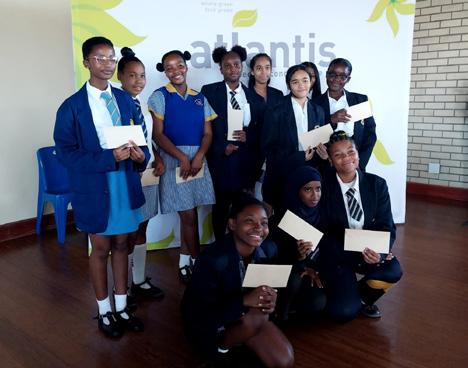
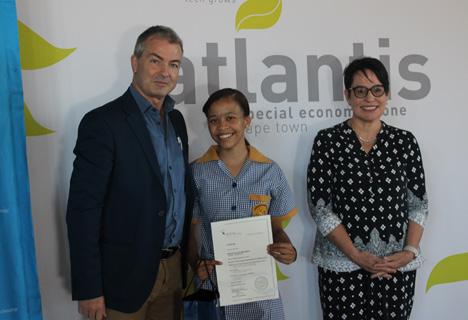
Prof Driekie Hay-Swemmer and CPUT Council member Mr Matthew Cullinan, also the CEO of ASEZ, attended the STEAM certificate award event.
Fundraising and alums relations
The Advancement Department serves as the University’s office for fundraising and alumni relations. It generates funds to support the University’s three core pillars: education and teaching; research, technology and innovation; and community engagement.
The Vice-Chancellor hosts a donor appreciation event
On 16 October 2024, CPUT Vice-Chancellor, Prof Chris Nhlapo held a donor appreciation event in Gauteng. He sincerely thanked the donors for their generous contributions, including bursaries, work-integrated learning opportunities, and internship funding for CPUT students. He also highlighted the high school learners who are gaining from the STEM and digital literacy initiatives that CPUT is implementing. This event solidified the collaboration between CPUT and its funders. The donors conveyed their gratitude for partnering with CPUT, and pledged their ongoing support for the University’s students.
Donations income
Centre for Diversity, Inclusivity, and Social Change (CDISC)
The Centre for Diversity, Inclusivity, and Social Change (CDISC) is dedicated to fostering a transformative, inclusive, and diverse institutional culture through the implementation of CPUT’s Institutional Transformation Framework. Aligned with Vision 2030, the Centre supports the University’s principles of Oneness and Smartness, which are based on the foundational values of ubuntu (human centricity), ubunye (unity), and ukungafani (diversity). These principles guide the Institution towards enhanced equity, social unity, and inclusivity.
Transformation at CPUT is a complex and essential priority that influences all areas of institutional life. It affects governance, the experiences of staff and students, teaching and learning, curriculum development, research, innovation, and community involvement. This comprehensive approach aligns with the recent recommendations from the Council on Higher Education’s (CHE) 2021 reports concerning equity and transformation, advocating for a systemic and integrated strategy to foster inclusive academic and administrative environments.
The 2023 research report by the Ministerial Oversight Committee on Transformation in South African Public Universities (TOC) underscores the critical need for universities to reflect transformation within their governance, leadership, and management structures. Through these guidelines, CPUT, via CDISC, is dedicated to transforming fundamental aspects of institutional practice. This commitment ensures that diversity and inclusivity influence the experiences of both students and staff, and the University’s overarching impact on society.
Key highlights for 2024
The 2024 CDISC Annual Report is organised by numbers, addressing the seven key focus areas of CPUT’s Vision 2030. It aligns with the Institutional Transformation Pillars detailed in the Transformation Framework. Feedback for each focus area highlights the initiatives pursued within that domain:
FOCUS AREA 3: Smart RTIP that is relevant and excellent in knowledge production
International Women’s Day celebration
In collaboration with the Division of Student Affairs (DSA), Higher Education Resource Services South Africa (HERS-SA), and other stakeholders, an International Women’s Day event was held on 8 March 2024, under the theme: “DigitALL: Innovation and Technology for Gender Equality” #InspireInclusion. The purpose of the event was to celebrate International Women’s Day by:
• Showcasing the power of mentoring in eliminating inequity and gender bias;
• Discussing ways of bridging the gender digital divide to achieve Sustainable Development Goal (SDG) 5 in higher education;
• Strengthening CPUT’s mentor–mentee relationship to empower young women; and
• Celebrating and highlighting women’s achievements and opportunities.
The event attracted a large audience, and included a speaker from the University of Leeds. During the celebration, CDISC provided information-sharing materials addressing topics such as Human Trafficking (a type of violence), Healthy Lifestyles, Budgeting Tips for Students, and Gender-Based Violence (GBV). The pamphlets covered aspects, including:
• GBV: Steps to Initiate a Domestic Violence Protection Order;
• Directory of Thuthuzela Care Centres in the Western Cape; and
• Recognising an Abusive Relationship.
CPUT Food Colloquium
A Food Security Colloquium, organised by DSA, in collaboration with CDISC, was held at SARETEC on 10 May 2024. Notable speakers included the Dean of Students, Nonkosi Tyolwana, and Prof Paul Green, Chairperson of the Institutional Transformation Forum.
Goal 1 of the Sustainable Development Goals (SDGs) seeks to alleviate poverty. The 2023 Progress Report on SDGs indicates that if trends persist, more than 340 million women and girls will remain in extreme poverty by 2030. At CPUT, tackling poverty is a collective responsibility, reflecting the diverse needs of our student community. The colloquium aimed to adopt an institutional approach to food insecurity, further linking to Vision 2030. The following outcomes flowed from the colloquium:
• Awareness and sensitisation regarding food insecurity, and sharing of best practice related to current initiatives were achieved;
• An awareness of current practices within CPUT about food security was created;
• Sustainable approaches to food security at CPUT were identified;
• Student and staff experiences about food insecurity were shared;
• Areas for collaboration and integration to work towards a unified approach were identified; and
• Institutional commitment towards food security and collaboration was strengthened.
FOCUS AREA 4: Smart Human Capital and Talent
The focus is on smart human capital (people) and talent to ensure that CPUT remains focused on people as our most important resource. Part of this focus area relates to fighting the scourge of GBV as a social ill to promote a culture of human-centricity and smart people with integrity and mutual respect, in support of One Smart CPUT. The activities, therefore, outline actions that give effect to achieving this goal, with a particular focus on all staff.
Capacity Building Workshop for Institutional Transformation Forum (ITF) Coordinators
The goal of this workshop was to empower ITF Coordinators regarding the Higher Education Barometer, which offers crucial indicators for transformation reporting. The proposed reporting template was introduced, which aims to simplify the quarterly and annual Institutional
Transformation reports, aligning with CPUT’s Vision 2030 and the DHET Transformation Barometer. The 9 April 2024 session, held via MS Teams, featured A21 South Africa – a human trafficking organisation, which provided an awareness presentation on identifying and reporting trafficking in persons. The ITF Coordinators responded positively to the insights shared. CDISC continues to support and collaborate on initiatives centred around transformation themes.
Promoting psychological safety and inclusivity: CDISC and Human Capital training sessions on sexual and gender-based violence (SGBV) awareness and diversity
CDISC and Human Capital (HC) arranged training through the EAP service provider, Momentum. The training will be facilitated continuously. Topics included:
• Awareness SGBV and Psychological Safety Training; held on 18 September 2024.
• Diversity, Inclusivity, and Belonging Training; held on 19 September 2024.
The two online training sessions saw high levels of attendance. Both staff and students engaged actively in the exercises, addressing key issues related to the training subjects. Participants acknowledged the importance of these initiatives in fostering open dialogue and improving awareness of diversity, inclusivity, and the prevention of SGBV.
Institutional Gender-Based Violence Committee (IGBVC) Capacity Building Session: Strengthening institutional responses
On 1 October 2024, a successful capacity-building session was conducted to enhance the IGBVC’s initiatives, led by Sixolile Ngcobo, Director of the NSPGBVF Localisation Lab. It sought to explore the six pillars of the National Strategic Plan on Gender-Based Violence and Femicide (NSP-GBVF) in the higher education sector, emphasising pinpointing gaps, and highlighting best practices in implementation. The dialogue went beyond CPUT’s context, tackling broader issues and challenges in higher education.
FOCUS AREA 5: Smart Internationalisation
Focus Area 5 highlights the need for the CPUT community to adopt internationalisation, connecting it with diversity and inclusivity. This area aims to cultivate a multicultural and global academic community, with capacity building as a key enabler in achieving this objective. Diversity and inclusivity are essential for effective internationalisation. The activities listed below are associated with this focus area.
CPUT Africa Day Public Lecture
CDISC held the 2024 Africa Day Public Lecture titled, “Cultural Diversity and Identity in African Higher Education Institutions” on 24 May 2024, online via MS Teams. Prof Lungisile Ntsebeza, an Emeritus Professor and Senior Research Scholar in African Studies and Sociology at the University of Cape Town (UCT), presented the keynote address. Respondents included Prof Gilingwe Mayende (DVC: Operations), and Thandekile Ndlovu (LSRC Deputy Chair) at CPUT.
The purpose of the Africa Day Public Lecture included the following:
• Promoting cultural variety and identity in African institutions to enhance the educational experience and academic atmosphere;
• Encouraging debate and thought on the difficulties, possibilities, and complexity of increasing cultural diversity in higher education institutions;
• Highlighting African higher education institutions’ distinctive cultural assets and contributions to the global academic community;
• Encouraging critical thinking and inquiry regarding the impact of culture on education, knowledge creation, and social transformation; and
• Contributing to advancing scholarship, policy development, and institutional practices to promote cultural diversity, social justice, and sustainable development in African higher education.
Enhancing
mentorship through diversity and inclusivity awareness at CPUT
The Institutional Transformation Framework is based on three core strategies, namely, transformation, mainstreaming, and intersectionality. Key aspects of intersectionality are diversity and inclusivity, which are essential for institutional change and the realisation of Vision 2030, especially in Focus Area 5. Utilising diversity and inclusivity as strengths across CPUT is becoming increasingly crucial. Mentors and Retention Officers are vital in shaping the experiences of first-year students as they move from high school to university.
To facilitate this process, awareness sessions were conducted throughout the year, mainly online, for participants in the First-Year Experience (FYE) programme. These sessions aimed to deepen their comprehension of gender, diversity, and inclusivity, ultimately enhancing the quality of their contributions within CPUT’s multicultural environment.
Orientation presentations to first-year students
On 15 February 2024, CDISC hosted a presentation for the Biomedical Sciences Department during the first-year orientation. A presentation about diversity and inclusion on 15 February 2024 was aimed at first-year students in the Management & Project Management Department. The presentations also included the services offered by the Centre, further inviting interested students to participate in the programmes, and to gain experience and develop themselves. Mentimeter was used to facilitate engagement and feedback. Positive feedback was received.
First-Year Welcome – Wellington Campus
On 12 February 2024, CDISC participated in the FirstYear Welcome event on Wellington Campus, distributing pamphlets covering human trafficking, healthy lifestyles, budgeting, employment guides, resources for men’s development, and the Centre’s role within CPUT.
Diversity and Inclusivity Champions
CDISC, in partnership with DSA’s Disability Unit, provided Diversity and Inclusivity Champions training on 9 February 2024. This programme serves as peer support, rooted in the idea that students are more likely to seek help from their peers when facing concerns or challenges. It emphasises the importance of student-to-student connections.
Heritage Day lunch hour event
On 19 September 2024, CDISC, in partnership with CPUT Library Services, participated in a Heritage Day event at the Bellville Campus Pool House. The event, themed “Unpacking Cultural Diversity,” was a lively celebration of the University’s rich cultural diversity, featuring engaging discussions, an interactive drumming session, and a vibrant fashion show, showcasing traditional clothing from various cultures at CPUT. Through these activities, a deeper appreciation for cultural diversity was fostered, while advocating inclusivity as a pillar for driving social change.
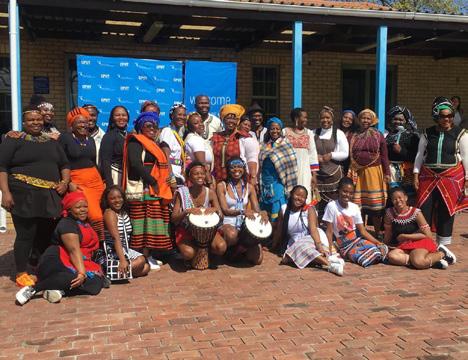
FOCUS AREA 7: Smart student engagement and learning experiences
Focus Area 7 of CPUT’s Vision 2030 emphasises smart student engagement and learning. It aims to establish a comprehensive CPUT student experience by providing development and training for student representatives, enabling them to prepare for, and effectively participate in, governance frameworks, thereby enhancing the overall student experience. The activities listed below highlight this focus area.
Student Representative Council (SRC) induction
On 25 January 2024, CDSIC participated in the SRC induction, which featured two key presentations. The first focused on Transformation in Higher Education, highlighting various aspects of transformation, including digital changes, curriculum adjustments, social elements, leadership evolution, governance and management updates, research and knowledge production enhancements, higher education funding system reforms, and institutional environment improvements. The second presentation centred on the HeforShe Programme, aimed at equipping young men with skills to advocate against GBV, and promote gender equality in a society that inherently incorporates gender mainstreaming. Additionally, a joint project presentation by CDISC and DSA, titled EmpowHerCPUT and CPUT Queer Unicorn, was also shared.
Crucial Conversations 1: Recognition of Voices –Voices and Spaces
CDISC engages in various diversity, inclusion, and belonging activities. It collaborated with Pillar 6 of the IGBVC on Research and Information Management to host its inaugural Crucial Conversation on 15 April 2024, themed “Voices and Spaces, Creating Inclusive Spaces” #RecognitionOfVoices. The goal was to amplify diverse voices, and create platforms and opportunities for individuals from all backgrounds to share their stories, perspectives, and experiences. Through this session, the anticipated outcomes were to:
• Encourage open dialogue and understanding: Support respectful communication among various groups to foster understanding, empathy, and acceptance.
• Enhance accessibility: Create inclusive environments by ensuring that physical and digital spaces are accessible to individuals of all abilities, particularly those with disabilities.
• Tackle systemic inequalities: Recognise and confront systemic barriers that hinder certain voices from being heard, or limit full societal participation.
• Foster collaboration and co-creation: Promote teamwork among stakeholders to design and develop inclusive spaces catering to everyone’s needs.
• Advance diversity and inclusion while nurturing a sense of belonging for all CPUT staff, students, and our community: The in-person event at SARETEC was live-streamed on the CPUT YouTube channel.
The programme featured the CPUT Queer Unicorns; CPUT SRC President; CPUT nGAP Lecturer and Researcher; Provincial Manager for the Commission for Gender Equality; an international speaker on transgender matters from the University of Indiana, USA; a Kinsey Institute Global Ambassador; a transgender advocate from the USA; an education trainer from the Triangle Project; and an Education Programme Manager from Gender Dynamix. The programme was facilitated by the Chief Financial Officer: South African Higher Education Queer Alliance, the Director: NSP-GBVF Localisation, and the Director of Fundani. The IGBVC Pillar 6 Committee Member rendered closing remarks.
Crucial Conversations 2: Gender Diversity, Inclusion and Social Change
On 12 September 2024, CDISC, in partnership with DSA and Pillar 6 of the Institutional IGBVC, held Crucial Conversation 2, focused on “Gender Diversity, Inclusion and Social Change.” The theme resonated strongly with all attendees. Keynote speaker Llizelle Kumalo, from the Centre for the Study of Violence and Reconciliation, delivered an engaging talk on the role of gender diversity and inclusion in fostering impactful social change.
Highlights of the session included a presentation by the Triangle Projects team on the intersectionality of gender issues and its profound impact. Babalwa Gusha from UCT’s Office for Inclusivity and Change shared insightful success stories of transformation within higher education, and showcased UCT’s strides toward transforming the Institution. Clive Brown (Faculty of Education) spoke on the role of education in promoting gender diversity; and Lolwethu Luthuli (Faculty of Business and Management Sciences) discussed leveraging research and data to drive gender inclusivity.
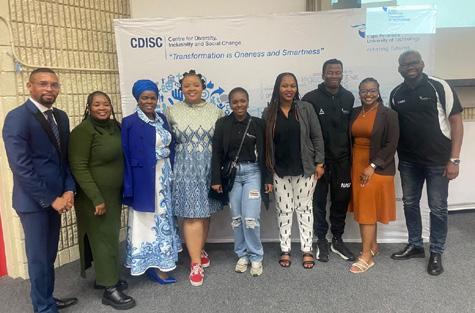
Women’s Month Celebration
In response to the Policy Framework on Addressing GBV in Higher Education (2020) and the achievement of SDG 5 on Gender Equality and Women Empowerment, the Vice-Chancellor localised the GBV National Strategic Plan on GBV to respond to Vision 2030. The Centre for Diversity, Inclusivity, and Social Change hosted a Women’s Day event themed, “Accelerating Women’s Empowerment and Gender Equality: Commemorating the 2024 Women’s Month and Celebrating the SmartCPUTWomen”. Human Capital and the Advancement Department collaborated on this event, which was held on 6 August 2024.
The event celebrated the #SmartCPUTWomen’s contribution to achieving Focus Area 7 of CPUT’s Strategic Vision. The event was well attended, and the Institution appreciated the opportunity to give women employees the platform to celebrate and enjoy each other as women.

Panel members at the CPUT Auditorium at Bellville Campus during the Women’s Month Celebration. Seated L to R: Executive Director: Office of the Vice-Chancellor, Prof Driekie Hay-Swemmer; Director: NSP-GBVF, Sixolile Ngcobo; Senior Director: Human Capital, Ms Vuyokazi Dwane.
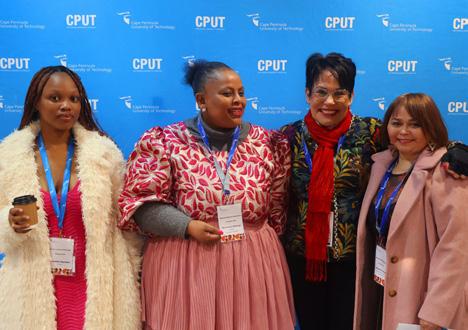
of the attendees and speakers at the Women’s Month Celebration.
References
Cape Peninsula University of Technology (2020) Strategic Plan 2021–2030: One Smart CPUT. [accessed: October 27, 2023]. https://www.cput.ac.za/storage/services/QMD/V2030%20STRATEGIC%20PLAN-ONE%20SMART%20 CPUT%20v12.pdf
Council on Higher Education. (2021). Equity and transformation in higher education: A report on the state of higher education in South Africa.
Department of Higher Education and Training (2016). [accessed: October 27, 2023]
The Policy Framework for the Realisation of Social Inclusion in School Education and Training Institutions https://www. dhet.gov.za/SiteAssets/Latest%20News/2017/January/Gazetted-Policy-Framework-for-the-Realisation-of-SocialInclusion-in-PSET-No40496-Notice-no-1560.pdf
Department of Higher Education and Training (2020). Policy Framework to Address Gender-Based Violence in the PostSchool Education and Training System [accessed: October 27, 2023] https://www.dhet.gov.za/Social%20Inclusion/ DHET%20GBV%20Policy%20Framework%2030July2020.pdf
Department of Higher Education and Training. (2022). Report on the transformation of higher education in South Africa.
Department of Justice and Constitutional Development (2020). National Strategic Plan on Gender-Based Violence and Femicide 2020-2030 [accessed: October 27, 2023] https://www.justice.gov.za/vg/gbv/nsp-gbvf-final-doc-04-05.pdf
South African Human Rights Commission (2018). Report on Transformation at Public Universities in South Africa [accessed: October 27, 2023 https://www.sahrc.org.za/home/21/files/SAHRC%20Report%20-%20Transformation%20 in%20Public%20Universities%20in%20South%20Africa.pdf
The United Nations Department of Economic and Social Affairs (Social Inclusion) Report [no date]. Goal 5: Achieve gender equality and empower all women and girls. [accessed: October 27, 2023]. https://social.desa.un.org/issues/ disability/envision-2030/envision2030-goal-5-gender-equality
Luescher, Thierry M.; Mncwango, Bongiwe; Fongwa, Samuel N.; Oppelt, Thelma; Mthombeni, Zama; and Paterson, Mark (2023). The State of Transformation in South Africa’s Public Universities. Research Report of the Ministerial Oversight Committee on Transformation in the South African Public Universities (TOC). Pretoria: TOC/Department of Higher Education and Training.


Dr Garth van Gensen
Director: Marketing and Communication Department
Marketing and Communication Department (MCD)
The Marketing and Communication Department (MCD) at CPUT has had a busy and fruitful year. Spanning five campuses, with nearly 40,000 staff and students, exciting events, innovations, and media opportunities abound. We leverage these to strengthen our university’s position as one of the leading universities of technology (UoT) in the country. Engaging our staff and students with the “Proudly CPUT” ethos, and ensuring our researchers and academics are influential in key national discussions, remain ongoing objectives. The following are some highlights of our achievements in 2024.
CPUT website
The revamped CPUT website is a key project for MCD in 2024. As our main public communication channel, we have embarked on the most extensive website redevelopment to date. This includes redesigning the aesthetics, and upgrading the hardware and software. The site now features a range of exciting additions, including an AI-powered chatbot, automatic translation into three South African languages, and comprehensive accessibility options.
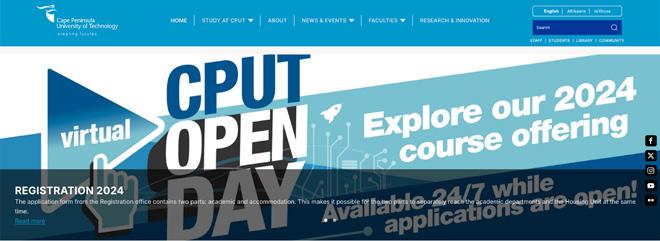
Graduation
MCD prides itself on constantly improving the graduation experience. Our award-winning live-streaming option saw a 27% viewership increase this year.
In 2024, we introduced a contactless graduate name system, rolled out during the Autumn ceremonies. The system allows the Dean to read the names, while all the relevant details of the individual are projected onscreen. It has streamlined the ceremony flow, and will enable us to increase the number of graduates capped during each ceremony.
The Autumn graduation was extra special, as an Honorary Doctorate was awarded to Banyana Banyana Coach, Desiree Ellis. MCD supported this unique event by coordinating media interest in Ellis, and liaising with most pre- and post-event logistics aspects.
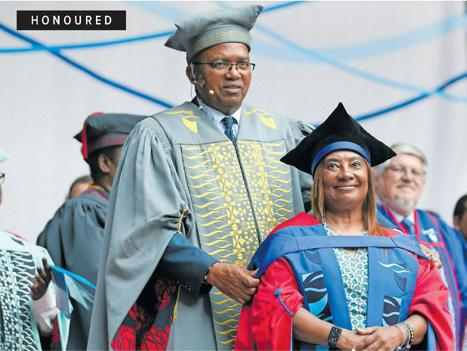
Social media
MCD’s goal on social media is to communicate engaging CPUT news and announcements to our stakeholders. We maintain three official CPUT social media channels, and these platforms continue to grow steadily. The Facebook page has witnessed a significant increase in its follower base, growing from 224,000 in 2023 to 238,632 followers in 2024. Similarly, our X channel has experienced steady growth, with the number of followers rising from 20,700 to 21,617; and Instagram increasing from 11,300 to 12,053.
WhatsApp channel
MCD has established an official CPUT WhatsApp channel that users can search for and follow. On this one-way broadcast channel, we post all CPUT news and announcements suitable for the general public’s consumption.
Events
Long Service Awards
Maintaining good staff morale requires a continuous focus on celebrating the successes and milestones of all sectors of our campus community. MCD organised the 2024 CPUT Long Service Awards ceremony, which celebrated the loyalty, commitment, and dedication of 240 staff members who served the Institution for an accumulated 4,190 years. Ten special staff members were honoured for having over 40 years of service.
CPUT hosts Absa Cape Epic
MCD was pivotal in producing and designing five Autumn 2024 Graduation booklets, saving the Institution great time and expense. In line with Vision 2030 values of embracing technology and searching for better ways of doing things, the booklets were designed to be distributed electronically. They were also made available as pageable resources on the CPUT website. A minimal number of hard copies were printed for use at the ceremonies.
CPUT’s Wellington Campus hosted the iconic mountain bike stage race. The picturesque campus served as the race village for two nights during the 20th edition of the gruelling race, which included 613 km of racing. The University was proudly represented by an alum team that placed exceptionally well in the overall rankings.
Open Day
2024 marked the first time the event has been hosted in person since 2019. Open Day 2024 attracted an estimated 18,000 learners, parents, teachers, and members of the public who were allowed to explore the University’s 2025 course offering, and interact directly with staff and students.


Annual SHERO Fun Run/Walk
The Shero Fun Run/Walk has become an annual event to celebrate Women’s Month. The run/walk around the Bellville Campus provides a fun and inclusive way for women to come together in a supportive and inspiring environment, while engaging wellness vendors on issues like financial literacy and the institutional employee assistance programme.
This year, Women’s Month was boosted by the addition of another popular event, the SHERO Drumming Circle. MCD invited women to unite, connect, and celebrate their collective strength and resilience through the joyful and rhythmic expressions of drumming, poetry, and dancing.
Media
With 69 CPUT researchers boasting NRF ratings, the University has one of the country’s most prominent research output capacities of any UoT. Research uptake articulates that research into the popular press, and 2024 has seen a phenomenal year of growth in that sector.
Our academics are regularly called upon to be expert commentators on a wealth of nationally imperative issues, such as economics, interest rate fluctuation, inflation, the education crisis, the merits of significant sporting events, or features on our cutting-edge research. This shows that CPUT is a university with great merit, staffed by competent academics participating in critical national discourse.
This participation in a national conversation was on display when CPUT was selected above all other regional universities to host the inaugural eNCA Townhall Debate in the lead-up to the national elections. It was an exceptionally well-executed event that the channel later used as a blueprint to replicate at other universities. The event garnered the Institution an average of R4 million in positive press.
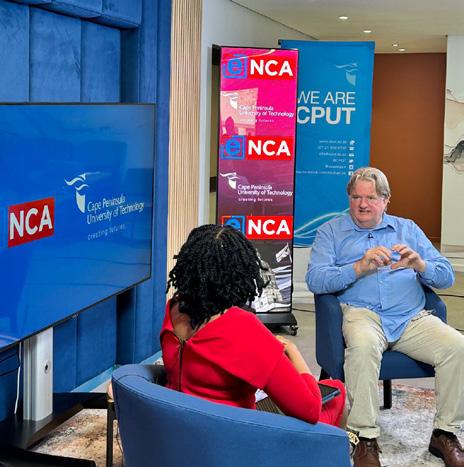
Publications
Several commemorative days are marked in the CPUT Desk Calendar 2024’s design and layout. These dates help promote awareness of themes and events central to CPUT’s vision, mission, and values. At the start of the academic year, printed calendars were distributed to all staff members, and have become widely used resources.
In collaboration with the Office of the Vice-Chancellor and the Department of Finance, the design, editing, and printing of the CPUT Annual Report 2023 proceeded as planned. The report is intended for electronic distribution or online viewing, which helps reduce printing costs.


Consolidated
Combined Assurance
The CPUT Combined Assurance Framework received Council approval in 2021, with implementation starting in the 2022 academic year, and further enhancements added in 2023. CPUT adopted this combined assurance model for a coordinated approach to all assurance activities within the University. This framework aims to tackle significant risks the University encounters, and facilitate effective communication among various leaders at CPUT, including the Council, its committees, Executive and Line Management, as well as assurance providers like Risk Management, Compliance Management, and Internal Audit.
Combined assurance involves collaboration between internal and external assurance providers to share information with Management and the University’s governance bodies. The aim is to integrate and harmonise assurance processes, allowing Executive Management and governance bodies – such as the Council and the Audit and Risk Oversight Committee (AROC) – to gain a comprehensive understanding of the University’s governance, risks, and controls, which helps them prioritise and take necessary action.
The CPUT Combined Assurance Framework (CAF) is designed to complement the University’s Risk Management Strategy. Risks are identified, assessed, and managed through various mitigations, including insurance, strategic initiatives, or tailored internal controls.
Principles of Combined Assurance at CPUT
CPUT has adopted a principles-based approach to combined assurance, based on the IIA’s Three Lines Model (IIA 20201). Designed to provide flexibility, the Council, Executive Management, and assurance providers are not slotted into rigid lines or roles. The CPUT CAF is based on six principles (Figure 1).
1 Institute of Internal Auditors. The IIAs Three Lines Model: An update of the Three Lines of Defense. https://na.theiia.org/about-ia/ PublicDocuments/Three-Lines-Model-Updated.pdf. [Online]
SIX PRINCIPLES OF THE CPUT COMBINED ASSURANCE FRAMEWORK
1 CPUT has implemented appropriate governance structures and processes that enable accountability by Council, action by Management, and assurance by Independent Audit.
2 Council and its subcommittees ensure appropriate structures and processes are in place for effective governance.
3 Management's responsibility to achieve CPUT’s objectives comprises both first- and second-line roles. First-line roles are mostly aligned with the delivery of services, and include the roles of support functions. Second-line roles assist with managing risk.
4 Internal Audit (Line 3) provides independent and objective assurance and advice on the adequacy and effectiveness of CPUT’s governance and risk management. This is achieved through systematic and disciplined processes, expertise, and insight.
5 Internal Audit's independence from the responsibilities of Management is critical to its objectivity, authority, and credibility.
6 All roles working collectively contribute to the creation and protection of value when they are aligned with each other, and with the interests of stakeholders.
Key roles in the CPUT Combined Assurance Model
Key role players in the CPUT Combined Assurance Model are the Council and its committees, Management (Lines 1 and 2), Internal Audit (Line 3), and external assurance providers. The areas of responsibility for these role players are generally described as:
• Accountability by Council to stakeholders for oversight.
• Actions (including managing risk) by Management to achieve organisational objectives.
• Assurance and advice by an Independent Audit Function to provide insight, confidence, and encouragement for continuous improvement.
The role players, their responsibilities, and their interactions are depicted in Figure 2.
Accountability to stakeholders for organisational oversight
Governing body roles: Integrity, leadership and transparency GOVERNING BODY
MANAGEMENT
Actions (including managing risk) to achieve organisational objectives
First-line roles: Provision of products/ services to clients; managing risk
KEY Accountability, reporting
Second-line roles: Expertise, support, monitoring and challenge on risk-related matters
Delegation, direction, resources, oversight
INTERNAL AUDIT
Independent assurance
Third-line roles: Independent and objective assurance and advice on all matters related to the achievement of objectives
Alignment, communication coordination, collaboration
This is a consolidated report of four of the combined assurance partners.
• Internal Audit (third line);
• Compliance Management (second line);
• Enterprise Risk Management (second line); and
• Business Continuity (second line)
Other second-line functions at CPUT include the Quality Management Directorate, which reports to the Office of the Vice-Chancellor and IT Governance; and the Safety, Health, and Environmental (SHE) Unit, which reports to the DVC: Operations.
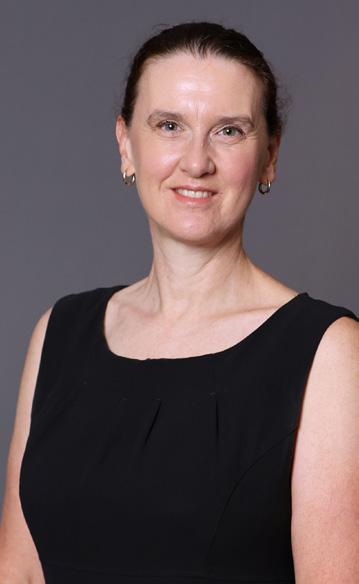
Driekie van Dyk
Director: Internal Audit
Combined Assurance: Internal Audit
CPUT’s Internal Audit reports functionally to the Audit and Risk Oversight Committee (AROC) of Council; and on an administrative level, to the Office of the Vice-Chancellor. The department has two permanent staff members, and receives support from BDO Advisory Services (Pty) Ltd as co-source partners.
The Internal Audit Strategy was approved at the March 2021 Council meeting. It was informed by Vision 2030, One Smart CPUT, with a Vision and Mission customised for CPUT Internal Audit.
VISION: CPUT Internal Audit strives to be the benchmark of excellence for internal audit functions in higher education in Africa by providing insightful assurance and advisory services that will operate as catalysts for enhancing the University’s ability to be globally renowned for cutting-edge innovation with graduates that shape a better world for humanity.
MISSION: CPUT Internal Audit will enhance and protect organisational value by providing risk-based and objective assurance, advice, and insight to support CPUT Vision 2030 – One Smart University through a combined assurance approach and cutting-edge technology.
The annual Audit Plan is developed using a risk-based audit methodology, and approved by AROC. Any changes to the Plan in response to changes in the risk landscape are also tabled at AROC for approval. The audit team is on target to complete the 2024 Audit Plan and any additions by the February 2025 AROC meeting.
Internal Audit’s Vision and Mission are delivered in three broad focus areas: People, Process, and Technology. Tactical implementation continued in 2024, focusing mainly on the Technology component and implementing an audit management solution. The strategy will be refreshed in 2025 to ensure it remains aligned with the Vision and Mission, while meeting stakeholder requirements and remaining compliant with International Internal Auditing Standards.
Three Areas of Strategic Focus
Focus 1: People
Attracting and developing the right mix of talent within CPUT Internal Audit to deliver on our mission and to add value to the University today, and to continue adding value in future by evolving in pace with changes at the University, while balancing between effective risk coverage and cost
• The first Audit Manager for CPUT Internal Audit joined the team in 2023 – further appointments are on hold in anticipation of the University’s Staff Establishment Project.
• CPUT Internal Audit will continue to rely on cosource partners to maintain continuity and access to specialist functions. The contract of CPUT’s co-source partner, BDO Advisory, was extended to end-2026.
Focus 2: Process
Using agile audit methodologies that are compliant to IIA standards to develop and deliver on an IAP that is responsive to risk, while also meeting stakeholder needs
• Audit methodology formed part of the onboarding processes for BDO and the Audit Manager, and remains under continuous development.
• Projects to demonstrate compliance to the new Global Internal Auditing Standards is planned for 2025.
Focus 3: Technology
Using modern audit technologies to enhance audit coverage and enable continuous adding, while also driving efficiency and fostering a culture of innovation and personal development in the use of technology
• The Diligent HighBond audit management solution was implemented in March 2024, with focus on the follow-up of previous audit findings. All follow-up activities are now done using the system.
• Diligent HighBond also has a data analytics and robotics solution. The Internal Audit team is embracing this capability in every audit engagement. Training has taken place in 2024, and further opportunities and use-cases are being explored. Analytics and automation will remain a key focus of the department in 2025.
• Combined Assurance partners also have access to Diligent HighBond to explore the system, which has capabilities that can be used by most Governance, Risk, and Compliance functions.

Sibusiso Mtatase
Combined Assurance: Compliance Management
The 2024 Compliance Annual Report outlines the advancements, challenges, and significant achievements of the Compliance Management Function (CMF) at CPUT. Our primary mission is to maintain high standards of ethics and compliance throughout the University. A strong Ethics and Compliance Programme is essential to CPUT’s identity, promoting transparency, accountability, and integrity. The CMF plays a crucial role in this initiative by ensuring the University meets national and international standards, while fostering a culture of ethical conduct among all stakeholders. Tasked with coordinating, facilitating, and advocating for a comprehensive, campuswide Ethics and Compliance Programme, the CMF guarantees that the ViceChancellor, Executive Management, Management Committee, and Council have effective controls and mechanisms to prevent, identify, and address compliance risks. We acknowledge the interests of our diverse stakeholders in our compliance commitment, which includes employees, the Council, service providers, regulatory authorities, Government, and importantly, our students.
The main aim of the CMF is to create a culture of ethical behaviour and strong compliance by implementing a university-wide Ethics and Compliance Risk Programme. This programme is supported by a well-structured framework, consisting of seven elements that work together to prevent, identify, and mitigate potential compliance risks across the University, thereby safeguarding its ethical and legal integrity.
Policy status updates
As of October 2024, notable progress has been achieved in the creation and approval of policies. The total number of approved policies has increased to 69, up from 22 in 2023. Additionally, 35 policies are under review, and ten are in development. This increase, paired with the launch of new policies, demonstrates a significant improvement in the scope and efficacy of our policy repository. With ongoing initiatives, we anticipate further enhancing this repository into a thorough resource for policy governance.
Culture of ethics and compliance
Ethics and compliance training and awareness
In 2024, CPUT notably enhanced its Ethics and Compliance training initiatives, engaging over 700 employees across diverse faculties. These programmes aim to raise awareness of ethical standards, university policies, and compliance requirements. By cultivating a deeper understanding of these principles, CPUT aspires to instill a robust culture of ethics and compliance throughout all levels of the Institution.
Ethics Risk Assessment (ERA)
4: Status of policies
In 2024, the Policy Library was officially launched, providing a centralised and easily accessible repository for all university policies. This repository is now available through the CPUT homepage, ensuring staff, students, and stakeholders can conveniently access the most upto-date policies. By aligning with the Policy Development Framework, the Policy Library enhances transparency, promotes accountability, and fosters consistent policy application across the Institution.
The Ethics Risk Assessment (ERA) has been rescheduled for 2025, following feedback from the Gartner Survey and the outcomes of the 2024 Ethics Awareness initiatives. This postponement allows for a more thorough assessment, which external experts will conduct. The ERA aims to provide deeper insights into ethical risks and vulnerabilities within CPUT, ensuring that the University can proactively address potential challenges, and strengthen its ethical governance framework.
Compliance Obligation Register and risk assessments
The Compliance Obligation Register aims to document all legislation impacting CPUT, and assess these regulations’ risk levels. The process involves collaboration with Legal Services, Risk Management, and ongoing stakeholder consultations.
Interface between institutional research (IR), compliance, and ethics
In 2024, the Compliance Manager was invited to speak at the renowned Southern African Association for Institutional Research (SAAIR) and CODATA Conference, and presented a highly regarded paper entitled, “The interface between institutional research, compliance, and ethics”. This presentation emphasised the vital importance of aligning institutional research practices with ethical standards and regulatory compliance, stressing the need to integrate these areas to promote responsible data management, informed decisionmaking, and effective governance.
Assessing risk and ongoing compliance initiatives
In 2024, CPUT actively collaborated with key compliance stakeholders to effectively evaluate risks. Continuous meetings and discussions have been crucial in identifying and managing potential threats. The University has prioritised topics such as data privacy, conflicts of interest, gifts, benefits, hospitality, and whistleblower procedures. Looking ahead, CPUT’s compliance initiatives will focus on centralising privacy oversight to enable more streamlined governance in this vital area. Furthermore, the University intends to enhance its compliance monitoring processes, improving the capacity to identify and address risks efficiently, while ensuring adherence to regulatory requirements and best practices.
Conclusion
The 2024 Compliance Annual Report showcases CPUT’s steadfast dedication to fostering an ethical culture and upholding national and institutional regulations. This year’s accomplishments underscore noteworthy progress in integrating compliance as a fundamental aspect of the University’s operations.
Combined Assurance: Risk Management
The Risk Management report highlights outcomes on risk governance, risk assessment, risk quantification and aggregation, risk monitoring and reporting, risk and control optimisation, risk culture, and continuous improvement initiatives for the financial (academic) year 2024. It overviews the tools, techniques, and practices (TTPs) employed at CPUT. Finally, a portfolio view of the 16 institutional risks is indicated.
Risk governance
ERM Framework & Methodology review
Risk technology: eGRC tender process for combined assurance tech investment Risk Management Policy review
ACFE Fraud Risk Governance and Management Scorecard results
Internal Audit Gartner ERM Review Project in progress on track

Manager: Enterprise Risk Management
The risk appetite and tolerance level limits were reviewed by Executive Management on 21 August 2024. The reviewed limits have been submitted to the Council for approval through the Audit and Risk Oversight Committee of Council (AROC). The Risk Management Policy has been updated per the University’s Policy Development Framework. The process will be completed through ratification by the Vice-Chancellor and Principal. The process of reviewing the ERM Framework and Methodology is in progress, and on track, and will be completed with approval from the ViceChancellor and Principal. The acquisition of a leading practice governance, risk, and compliance software platform to continuously automate and augment the University’s risk management and internal control environment is underway. The project is expected to go live by the first quarter of 2025. The University approved using the Association of Certified Fraud Examiners’ Fraud Risk Governance and Management Scorecard (ACFE FRGMS). A Senior Management session was facilitated on 30 August 2024. A fraud risk assessment is planned for the first half of 2025. The ERM Function has incorporated the recommendations of the Internal Audit ERM Review Report number 30 of 2023 into its implementation plan.
Sibusiso Mtatase Manager: Compliance Management
Risk assessment
All support service functions and faculties performed detailed risk profound dive assessments, led by the respective members of the Executive. All executives signed off on their divisional risk reviews during the first and second quarters of 2024. The Vice-Chancellor and Principal approved the Institutional Risk Review on 5 July 2024. The Combined Assurance (Risk) Champions appointed across all faculties and support service functions facilitate the second session of risk assessments, and update the ERM Function on the outcome as part of the control self-assessment. A Senior Management risk assessment session on the Vision 2030 Strategy was performed on 29 August 2024. Action plans were developed and monitored by the University’s Management Committee.
Risk quantification and aggregation
The University continues to leverage leading-practice initiatives, tools, and techniques to enhance its ERM maturity. Moreover, it continued employing qualitative and quantitative methods to improve its risk management approach.
Risk monitoring and reporting
CPUT, during 2024, continued to operationalise the Council-approved Combined Assurance Framework. The former Risk Champions Forum (RCF) evolved into the Institutional Combined Assurance Forum (ICAF). Three sessions are planned per year, with the first and second sessions conducted on 20 February and 28 May. The third session is scheduled for 15 October 2024. The minutes of all ICAF sessions are part of the standard ERM reporting to all risk governance committees of the Council. Executive Management monitors the 16 institutional risks, which include one opportunity relating to disruptive technologies, such as artificial intelligence (Al), generative intelligence, and artificial super-intelligence.
Risk and control optimisation
The University’s ERM Function approaches compliance and business continuity-related risks like any other. It plays risk measurement and reporting roles for all the University’s enterprise risks. From a combined assurance perspective, the ERM Function compares notes with the Internal Audit, Quality Management, IT Risk, Compliance, Business Continuity, and Safety, Health, and Environment functions.
Risk culture initiatives
A senior and middle management risk awareness session was held on 10 June 2024, focusing on various ERM topics, including fraud risk awareness (fraud prevention, detection, and deterrence) and information sharing. A total of 75 senior
university officials attended the session. The continuous, dynamic risk assessment sessions provide a conducive environment for ERM stakeholders to learn, unlearn, and relearn risk management across all areas of the University.
Continuous improvement initiatives
The University leverages its artificial intelligence (Al) guide, issued in 2024. The ERM Function continues to explore various options to employ AI, generative AI, and artificial super-intelligence in an ethically responsible manner. Other focus areas include data science, data warehousing, data mining, data analytics, embedded audit modules (EAMs), eGRC robotics, structured query language (SQL), VBA, SAS, Python, R, MATLAB, business intelligence applications, inter alia.
Portfolio view of top risks and opportunities: Managed by the University’s Management Committee
1. Institutional Cybersecurity
2. Emerging Risk: Long time taken to resolve Quality Improvement Plans
3. Enrolment Plan and Targets
4. Financial Health and Sustainability
5. Maintenance and Development of the Estate
6. Providing an effective, end-to-end, university-wide security and protection, fleet management, health and safety service, may be compromised
7. Strategic Human Capital Management
8. Student Experience
9. Institutional Resilience: Integrated Business Continuity Management (BCM), including IT Disaster Recovery
10. Compliance and Ethics
11. Environmental, Social, and Governance (ESG)
12. Alignment of ICT systems and infrastructure with CPUT’s future-focused teaching and learning requirements for V2030, including IT support
13. Opportunity: Disruptive Technologies
14. Stakeholder Engagement and Management
15. Research Productivity (Research and Innovation Optimisation)
16. Academic Programme Management and the Recurriculation process
Conclusion
CPUT responds to its pure risks and opportunities through various ERM tools, techniques, and practices (TTPs) to enable resilience and sustainability across all areas of its strategy and business model. The common denominator for strategic advantage and competitiveness will focus on strategic, tactical, and operational investments in information and related technologies, including AI, generative AI, and artificial super-intelligence within Council-approved risk appetite and tolerance limits.

Prof Mellett Moll Director: Business Continuity and Disaster Recovery Directorate
Combined Assurance: Business Continuity and Disaster Recovery
Business Continuity and Disaster Recovery serve as secondary assurance functions within the CPUT Combined Assurance Framework. The overall Business Continuity Strategy received institutional approval at all levels in 2022/23. This Function was established in early 2024, and became part of the Combined Assurance cluster. As the youngest member of the cluster, specific attention was given to the interfaces with the other members of Combined Assurance.
Health & Safety
• Integrated risk management across both operational disruptions and health and safety concerns
• Joint response plans focusing on both BCM and H&S
Protection Services
• Incorporate security considerations into business continuity planning
• Develop integrated emergency response plans to foster a cohesive approach to managing crises on campus Quality Management
Internal Audit
• Alignment in addressing risks to the resilience of the organisation
• Leverage Internal Audit’s assurance activities to validate the effectiveness of business continuity plans

• Ensure multimodal operation during disruptive events
• Collaborate on scenario planning to anticipate disruptions to academic operations, and develop contingency plans 1 6 2 5 3 4
Enterprise Risk Management
• Embed business continuity as a key component of enterprise risk management
• Work collaboratively to identify, assess and mitigate risks that could impact business continuity, and integrate into risk register
Compliance Management
• Ensure that business continuity plans comply with relevant regulatory requirements
• Integrate business continuity reporting into existing compliance reporting mechanisms
Figure 7: Relationship with other members of Combined Assurance
Over the last eight years, CPUT has faced multiple existential crises that required calm, integrity, and wisdom to manage effectively; failing which, these threats could have severely impacted the Institution’s operations. The lessons learnt from these experiences, particularly during the COVID-19 pandemic, prompted Management to establish a permanent organisational role dedicated to overseeing Business Continuity and Disaster Recovery. The Institution’s pandemic response is thoroughly documented. Despite the challenges during this tumultuous period, the team’s resilience, dedication, and skill in guiding the Institution through the crisis have formed a vital foundation for the newly established Business Continuity and Disaster Recovery Directorate. Fostering sustainability, resilience, and responsiveness has become crucial in universities worldwide, and CPUT’s Directorate has positioned the Institution as a leader in this aspect of higher education in South Africa.
VISION: An enabling environment where Vision 2030 is supported by preventing existential threats to achieving the strategy and the operations that underpin it
MISSION: Operational disruptions to the pursuit of Vision 2030 are anticipated to the degree possible; extensive plans are in place to proactively manage these disruptions, and the effect of these disruptions is minimised through state-of-the-art practices, technologies, and governance structures
Business continuity strategic focus areas
The following strategic focus areas have been identified in the Business Continuity Strategy:
• An enabling environment based on Business Continuity Management (BCM) policies, procedures, protocols, and governance structures;
• Accurate, continuous, and timeous detection of any existential threats to the continuity of CPUT’s operations;
• Establishment and maintenance of risk and business impact analyses for any existential threats to the continuity of CPUT’s operations;
• Establishment and maintenance of disaster recovery or contingency plans for any existential threats to the continuity of CPUT’s operations, on both the overall level and for the various portfolios in the organisation;
• Establishment and maintenance of cluster teams for any existential threats to the continuity of CPUT’s operations, that are knowledgeable enough to advise EM within their respective fields of expertise, and manage interventions as required by EM; and
• Establishment and maintenance of a research environment that continuously studies best practices in business continuity management and the underlying fields of expertise. Encourage research output as a dividend on the institutionalisation of the BCM process.
Organisational functions
Overall approach
For the implementation of this new feature, a strategy was adopted that divides BCM into two components: a longterm component centred on sustainable development; and a short-term component aimed at the resilience and recovery of essential institutional functions during or before a disruption.
1.1 Sustainable development
A long-term Sustainable Development Strategy was developed for CPUT under the guidance of the Business Continuity and Disaster Recovery Function. All the relevant governance bodies approved this Strategy, which is being rolled out on a project basis.
This Strategy is the fundamental guiding document for managing the Institution towards a more sustainable future. Of specific short-term importance is the Energy Strategy, which forms part of the six key pillars of the plan. A project team has been identified for each of these pillars. The importance of the Energy Strategy relates to the need to create and proceed with a blueprint for each campus regarding what is necessary to ensure the Institution maximises the use of renewable energy and its core skills in the area.
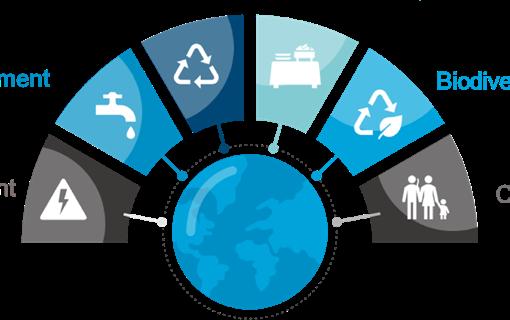
In addition to the above, the Business Continuity and Disaster Recovery Function has now adopted institutional environmental, social, and governance (ESG) reporting. This is largely because environmental reporting, which is vital to ESG, is closely tied to the Sustainable Development Strategy. This process involves creating a consensus-based ESG framework aligned with the GRI Guidelines, establishing a reporting structure, and executing ESG reporting.
Resilience
The short-term resilience aspect of BCM is organised into eight clusters, each managed by dedicated teams tasked with creating risk assessments, business impact assessments, preventative strategies, and risk mitigation or contingency plans tailored to their specific cluster. While these assessments were conducted at a high level in 2022, they are currently under review for ongoing relevance. The Institutional Business Continuity Forum (IBCF) detailed below plays a key role in promoting the widespread adoption of this process.
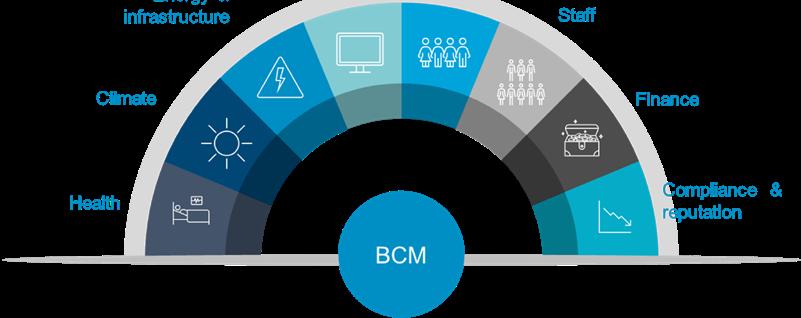
Institutional Business Continuity Forum (IBCF)
The IBCF is a forum created to foster the development, execution, and continuous assessment of business continuity and sustainable development practices throughout the Institution. The Executive Director: Office of the Vice-Chancellor (ED: OVC) serves as the ex-officio Chairperson of the IBCF. Operating under the strategic direction of the ED: OVC, the IBCF is managed operationally by the Director of Business Continuity and Disaster Recovery, and reports to the Executive Management (EM).
The IBCF was constituted with representation from the various EM portfolios and faculties, and knowledgeable people from areas where specialised knowledge is required. The Terms of Reference, Workplan, and Concept Agenda were approved at the first meeting of the IBCF in October 2024.
Business Continuity Policy
A preliminary consultative workshop was held to draft a policy on business continuity. This document will now be finalised, additional consultations will occur, and then presented to the appropriate authorities for approval.
Projects
Task Teams
The Business Continuity and Disaster Recovery Function successfully led a task team on student accommodation to resolve a crisis at the start of the 2024 academic year. Between 1,000 and 2,000 unplaced students arrived on campus without confirmed accommodation. How the response was led serves as a blueprint for similar crises in the future. Subsequently, a post-mortem analysis was undertaken with all role players to prepare for 2025. On request of EM, this preparatory team was expanded to include registration and appeals.
Strengthening BCM at CPUT
Contact was made with other higher education institutions to strengthen the Business Continuity and Disaster Recovery Function at CPUT. Through this initiative, a benchmarking exercise was undertaken by Unisa, who is now collaborating with CPUT in capacity building and knowledge sharing. Through this initiative, a forum on Business Continuity within Higher Education in South Africa is now envisaged. Further rollout of BCM processes is now undertaken in collaboration with Internal Audit.
Institutional Planning Directorate (IPD)
Academic
planning
Accreditation of new qualifications
In this reporting period, the Council on Higher Education (CHE) received four new academic programmes for accreditation, showcasing its ongoing dedication to broadening its academic offerings. These programmes include:
• Doctor of Marine Science
• Doctor of Emergency Medical Care
• Doctor of Philosophy in Nursing Science
• Master of Health Sciences in Transdisciplinary Health
• Master of Biotechnology
The evaluation of the Higher Education Quality Committee (HEQC) is still awaited for these programmes’ accreditation outcomes.
Accreditation of new sites of delivery
An application for accreditation has been submitted for a new delivery site at Newlands Cricket Grounds, which has achieved conditional certification. Furthermore, the Academic Planning Unit assisted the Faculty of Health and Wellness Sciences to gather the necessary documentation to propose a new delivery site at the Tygervalley Health and Wellness Building to CHE.
Registration of qualifications on the National Qualifications Framework (NQF)
New qualifications: The Postgraduate Diploma in Nursing Education successfully received registration with the South African Qualifications Authority (SAQA).
Re-registration of existing qualifications: The project to re-register qualifications on the NQF is ongoing, in partnership with CHE and SAQA. The Academic Planning Unit has gathered and shared faculty-specific qualification lists to support this initiative. A series of faculty workshops will take place in October and November 2024 to facilitate a seamless re-registration process.
Minor changes to existing qualifications
Various faculties proposed minor amendments to 56 qualifications, which were approved by the Qualifications Evaluation Committee (QEC) and the Senate Academic Planning Committee (SAPC).
Other activities
In addition to the key accreditation and registration functions, the Academic Planning Unit coordinated and supported several initiatives to ensure alignment with regulatory requirements and institutional objectives.
These included:
• Overseeing the phasing out of non-aligned qualifications with pipeline students;
• Launching a project to ensure that all qualifications at CPUT are correctly recorded on the Programme and Qualification Mix (PQM), accredited by CHE, and registered with SAQA;
• Organising a workshop on CPUT’s PQM, focusing on aligning with the Institution’s planning for the Future of Work. SAPC members and staff from the Institutional Planning Directorate (IPD) and Quality Management Directorate (QMD) attended this session;
• Communicating regulatory updates from the Department of Higher Education and Training (DHET), CHE, and SAQA, and implementing necessary actions in response;
• Hosting the Western Cape Regional Workshop on Criteria for Registration of Qualifications on the NQF and Key Requirements for Implementing the Higher Education Qualifications Sub-framework;
• Welcoming delegates from the United States International University–Africa (Kenya) and sharing insights into academic planning;
• Attending various workshops and events to remain informed of trends and regulatory changes in the higher education sector; and
• Supporting and advising academic departments in the design, development, accreditation, and registration of new and amended programmes.
Future activities
Looking ahead, the Academic Planning Unit has identified key areas for improvement and development:
• Technical errors identified in the PQM will be addressed by the end of the year, in collaboration with DHET;
• Discrepancies in qualification names on the ITS system and the PQM will be corrected through a dedicated project in 2025;
• The process and template for proposing minor amendments to existing programmes will be reviewed and refined;
• Developing and approving new qualifications will be streamlined to align with CPUT’s vision and mission. The Academic Planning Unit will be engaged from the initial conceptualisation stage to oversee compliance with regulatory requirements, and ensure that the programmes effectively prepare graduates for future workforce demands;
• A detailed guidelines document is being prepared to outline the steps and requirements for accrediting new delivery sites;
• A comprehensive manual will be compiled to support academic and administrative staff in navigating the complexities of the higher education regulatory environment. This manual will detail the CPUT-specific processes and procedures required to develop and approve new and amended academic programmes, providing clear, stepby-step guidance for compliance with regulatory bodies;
• Tracking of minor qualification changes will continue;
• Completing the PQM database, including collecting registration and accreditation letters, is a priority;
• Strengthening collaboration with QMD to ensure qualification reviews feeds into academic planning, and vice versa;
• Enhanced collaboration with Fundani to ensure academic staff receive comprehensive support in curriculum development; and
• A shared digital repository will ensure easy access to qualification-related information. This folder will house essential resources, such as qualification information, guidelines, policies, and templates. All academic staff will have access to this central folder, enabling more efficient referencing, and ensuring consistency in documentation.
In summary, the Academic Planning Unit will continue to focus on streamlining operations, fostering collaboration, and ensuring regulatory compliance to support CPUT’s strategic goals.
Higher Education Management Information System (HEMIS)
PowerHEDA updates: The Staff Programme Allocation has been fully implemented, and the Graduate List Report is now available to the Assessment and Graduation Centre (AGC) and faculties to aid in identifying graduates. “How To” video tutorials to help users with PowerHEDA queries are being planned.
Academic structure: All new qualifications and minor amendments have been documented within the academic structure. Adhering strictly to the approved deadlines, as per the institutional calendar, has facilitated timely submissions by faculties; and the Qualifications Evaluation Committee’s thorough processing of minor request changes is praiseworthy. We aim to enhance the precision of the academic structure in line with the approved PQM.
DHET submissions: All DHET submissions were made on time; therefore, no penalties for late submissions will be incurred.
HEMIS audit: Deloitte Touche Tohmatsu Limited, the new external auditors, were appointed for the AY2023 audit. Once again, CPUT obtained a clean 2023 HEMIS audit, with no findings.
Automation of HEMIS reporting: The HEMIS menu options have been optimised to run daily on ITS, automatically transferring data into the HEDA warehouse. This improvement allows the system to generate weekly validation reports that are emailed to key stakeholders for prompt issue resolution.
Annual registration Business Acceptance Testing (BAT) support to faculties: The BAT tracking system, introduced in 2022, enabled faculties to track their application and registration test cases, achieving a total 100% testing rate for the 2025 Application BAT. This led to significantly fewer challenges when applications opened in May 2024, compared to past years, ensuring that each faculty examined every application combination available. For the 2025 Registration BAT, which commenced on 7 October 2024, HEMIS included an additional layer of monitoring per unique registration combination, such as qualification, period of study, subject, and offering type. HEMIS will also test minimum and maximum credits enrolled to eliminate fatal validation errors where students are over-enrolled in academic Statistics Credits for one academic year.
Moving ahead, we will guarantee that all faculties conduct testing annually, enhancing both registration readiness, and the accuracy of HEMIS data.
Institutional Research (IR)
Residence Life Survey – November 2023
This detailed report offers a thorough examination of the residential experience at CPUT. Built on a strong conceptual framework, the study seeks to explore the complexities of on-campus living, covering various aspects, including living conditions and facilities, residence services, service provider performance, safety and security, kitchen services, social dynamics, diversity, as well as the impact on personal development, academic motivation, and challenges.
Recommendations included:
• Facility and service enhancements: Address noise levels, timeliness of repairs, and temperature regulation concerns;
• Safety and security: Review and enhance the flexibility of the Room Change Policy;
• Kitchen services: Address concerns about the cleanliness of the kitchen area and service for storing and preserving food;
• Social dynamics and diversity: Continue fostering an inclusive environment, respecting diversity;
• Academic support and engagement: Enhance support for independent study skills and selfdiscipline; and
• Continuous feedback mechanism: Establish and promote effective feedback channels for ongoing improvement.
Postgraduate Student Experience Survey (PSES)
CPUT needs to clarify its strengths in teaching and research excellence. In the Strategic Plan 2021–2025, particularly under Strategic Goal 7: “A smart, holistic CPUT student experience”, the University has offered various channels for students to give constructive feedback about their university experience. This includes executing improvement plans, and ensuring student voices are acknowledged and represented in governance and decision-making processes. All ethical clearance letters were received in July 2024, and IR has received permission from Dr Hester Burger and Fundani Rec. to proceed with the study. IR will conduct the online survey in November 2024.
Graduate Destination Survey (GDS)
2023/2024
GDS December 2023
The pilot study concluded in December 2023. The online survey tool was evaluated, yielding excellent results. A response rate of 20% was achieved, with 101 responses from a potential 514 graduates. Ethical clearance has been granted to move forward with the survey.
GDS April/May 2024
The April/May/June 2024 data have been collected, and the study was closed online at the end of June 2024. A response rate of 32% was reported, with 2,391 responses out of a possible 7,359 graduates. IR analysed the data set in an SPSS software programme, finalised the Excel data report, cleaned up the data, and generated the frequencies for the study. IR will now engage with the data, and finalise the report in November.

Dr Siyanda Makaula
Director: Quality Management Directorate
Quality Management Directorate (QMD)
An enabling environment for a smart, integrated quality management and assurance ecosystem
Quality Management and Assurance (QMA) Policy
In 2024, QMD made notable strides by reviewing its Quality Management and Assurance Policy to better align with the Quality Assurance Framework and its objectives. The first Policy Working Group (PWG) meeting took place on 22 February 2024, initiating extensive discussions with the QMA Policy Project Team. Policy consultations occurred in broader and narrower formats in April 2024. The draft was sent to the Language Unit and a critical reader for review. Once feedback was received, the draft was forwarded to legal services for vetting. On 22 June 2024, the Policy was submitted for Council approval. At the Council meeting, feedback indicated that the Policy was approved and ready for implementation.
Quality Management System (QMS) digital system
QMD is creating a comprehensive digital Quality Management System to foster a transformative quality culture in higher education. This system will effectively handle data and information via internal data management tools and CHE’s Quality Assurance Framework (QAF) Dashboard as part of QAF requirements for institutions. It has received approval, and development planning for this digital system is currently underway, in partnership with Computer and Telecommunications Services (CTS). Additionally, QMD is considering collaborations with an academic department to help develop part of the Quality Management Digital System to meet project needs.
Institutional Quality Forum (IQF)
The inaugural IQF meeting was held on 5 April 2024. According to the IQF Terms of Reference (ToRs), the Faculty Quality Forum (FQF) chairpersons summarised the quality activities from the first quarter for each faculty. The Students’ Quality Desk (SQD) gave feedback on their initial quarter meetings. The chairperson presented an overview of the Draft Implementation Protocols for External Quality Assurance (EQA) Functions within the Quality Assurance Framework. The project plan for developing the Quality Management and Assurance Policy was also discussed.
The second IQF meeting took place on 7 June 2024. During the meeting, brief updates on FQF engagements were presented by each FQF chairperson. Updates on the Quality Management Practice Standards were provided, detailing events since the April 2024 meeting. CHE’s final report on the institutional audit was presented, covering outcomes, recommendations, and commendations. It was decided that the IQF would oversee the development of the CHE–IA Quality Improvement Plan.
The third IQF meeting, held on 5 September 2024, was attended by all faculties and support departments. The FQF chairpersons shared updates on quality initiatives within their faculties, and reflected on feedback from previous FQF meetings. The Director of QMD delivered a presentation focusing on the Higher Education Practice Standard regarding Modes of Learning and Teaching Provision. Other agenda items included discussions on the Improvement Plan for the CHE Audit Report, and a presentation regarding the Excellence in Quality Awards, slated for 25 November 2024. The last IQF meeting for 2024 is scheduled for 7 November 2024.
Assure quality and enhance accountability
A reflective and cyclical quality assurance system was implemented at the start of the 2024 academic year, aligning with QMD’s three-year Qualification Review Plan. This Plan includes both internal and external evaluations involving professional bodies. Conducting qualification reviews is essential for maintaining public trust in the quality and integrity of the qualifications offered by an institution, ensuring they meet national and international standards. The review process reflects on all activities within academic and support departments, identifies best practices, and establishes improvement plans for the ongoing development of the academic project. Qualification reviews enable CPUT to assess the curriculum’s effectiveness, and utilise these insights to track progress toward CPUT’s strategic objectives and V2030. The qualification review schedule was developed in consultation with the faculties and departments, and approved by the Quality Assurance and Risk Management Committee (QARM) in January 2024.
The quality review team nearly doubled the number of internal reviews conducted, compared to the previous year. The external quality reviews are evaluated by professional bodies, external academic experts, and industry peers in the respective fields, who assess the internal quality reviews. Quality reviews continuously ensure the quality of educational qualifications, and enhance accountability. The reviews adopted a generative, reflexive, and contextually responsive way to constantly improve practice in a professional field.
In 2024, 11 internal reviews and seven external reviews were successfully completed. All 11 internal review reports and some external reports were received promptly. However, certain external review reports were delayed, indicating a need for improvement in this area.
2024 Internal qualification reviews conducted
Academic departments
1. Retail Business Management
2. Entrepreneurship Business Management
3. Marketing
4. Food Sciences and Technology
5. Chemistry
6. Cape Town Hotel School
7. Media and Communication: Film Production; Journalism; Photography; Public Relations
8. Architectural Technology and Interior Design
9. Wellness Sciences
10. Information Technology
11. Applied Design: Fashion Design; Jewellery Design; Visual Communication; Product Design
2024 External qualification reviews conducted
Below is a summary of the outcomes of the qualification reviews. As per the CHE guidelines, the evaluation criteria were used to evaluate programmes leading to qualifications. The Undergraduate Self-Evaluation Report (SER) was developed and assessed separately from the Postgraduate SER. In general, most departments met the minimum evaluation criteria (green), some areas were commended (blue), and some areas were identified as needing improvements (orange). No areas were determined to be non-compliant with the minimum criteria.
Academic Departments
Real Estate (SACPVP)
Horticulture Technology (SACLAP)
Emergency Medical Sciences (HPCSA)
Chemical Engineering
Electrical and Computer Engineering
Mechanical and Mechatronics Engineering
Maritime Studies
Nursing Sciences

The achievement in conducting the quality reviews in 2024 was in the timeous acceptance of the invitations to participate in the quality reviews, the briefing meetings held with panel members and staff before the site visit, support from QMD colleagues, and planned and constant communication with the Heads of Department (HoDs). The external and internal panel members’ briefing sessions and consultations before the 2–3 days site visit significantly improved the preparation of the quality reviews. The external and internal panel members’ tireless team spirit before, during, and after the site visit was commendable. Debriefing sessions with HoDs, staff, and students after each interview proved successful. This intervention ensured feedback was received after each session. The discussions are usually centred around the fairness of the review process, whether the interviews met interviewee expectations, and identifying any glitches that may require immediate intervention by QMD or the review panel chairperson.
Internal reviews: Numerous challenges arose, such as unreliable Internet connections that hindered panel members’ optimal participation during the virtual site visit. Recruiting internal panelists proved difficult; multiple invitations were required before at least three were accepted. Furthermore, industry partners and Advisory Board members often did not respond to invitations for qualification reviews. In some cases, students had to be contacted directly to attend
interviews with panel members. Additional challenges surfaced with certain HoDs, particularly regarding the late submission of the departmental SharePoint link and evidence files to QMD for the document checks session. Consequently, the review team faced pressure to produce reports swiftly.
External reviews: Several professional organisations failed to communicate their review plans on time. QMD requires advanced knowledge of these plans, as its processes must be finished before site visits. Issues such as insufficient collaboration with QMD, academic overreach with overly prescriptive recommendations that hinder innovation and flexibility, pressures to meet unrealistic expectations from professional bodies, a solitary decision-making approach, and, at times, members’ inexperience and professional conduct all create significant challenges. The South African Maritime Safety Authority’s (SAMSA) ongoing lack of collaboration with CPUT further complicated review processes. After announcing they would visit CPUT, the South African Nursing Council (SANC) did not schedule a site visit. Instead, the HoD informed us that they would make an unannounced visit. This is neither a CPUT nor a CHE review approach; and we intend to challenge it.
Commitment to continuous quality improvement
Central to CPUT’s Quality Function is the planning for quality improvement. This serves as a fundamental pillar in quality management, aimed at embedding a quality culture, and delivering superior quality. These improvement plans arise from the results of quality reviews.
Institutional audit QIP
On 2 May 2024, CPUT received a letter and the final report of the institutional audit. Among the four focus areas and 16 standards evaluated, ten received a functional rating, while six need substantial improvement. Overall, the Institution is deemed functional. In response, CPUT has been tasked with developing an Improvement Plan to address the
recommendations in the final report. This Plan is due for submission to CHE by 18 October 2024. Templates for this Improvement Plan have been shared with various responsible individuals, allowing them to craft responses to CHE’s recommendations. QMD has been delivering presentations to these individuals to assist in completing the QIP template, and to clarify CHE’s expectations. Before being submitted to CHE, the final draft of the Improvement Plan will be reviewed by QARM for approval.
Departmental Quality Plans (DQIPs)
DQIPs are developed, approved, validated, and regularly monitored in cooperation with academic department heads. In 2024, QMD further refined and validated the DQIPs to evaluate progress in addressing findings and resolving issues noted in them. Completing items on the DQIP signifies an improvement in the department’s quality management systems’ functionality and maturity. From November 2023 to September 2024, QMD implemented, monitored, and validated the DQIPs across two cycles. Additionally, QMD organised two DQIP Head of Department feedback meetings in 2024, which also served as workshops emphasising the significance of DQIP processes. These workshops offered a chance for reflective engagement on the DQIP process, and underscored areas for potential improvements in enhancing the overall processes.
Blue-flagged and red-flagged departments
Representing the Office of the Vice-Chancellor, QMD is pleased to announce the departments that earned blueflag status in the March 2024 DQIP validation cycle. This recognition is given to those departments that have effectively resolved all findings in their DQIPs. Additionally, departments with red-flag status were noted, and Deans were asked to offer the needed support to help HoDs tackle the remaining findings in future validation cycles. The chart below illustrates the advancements made by various departments and faculties in resolving issues. Since July 2023, there has been a noticeable rise in the number of resolved items across the six faculties.
Doctoral Review Quality Improvement Plan (DocQIP)
In September 2022, the Council on Higher Education (CHE) approved the Doctoral Review Quality Improvement Plan (DocQIP). Subsequently, QMD collaborated with the Centre for Postgraduate Studies (CPGS) to submit progress reports, with the final report sent on 31 May 2024. CHE confirmed receipt of this progress report, and CPUT is now awaiting feedback. Positive responses have been received from CHE regarding the addressed recommendations in the submitted progress reports.
Reflexive engagements – engaged staff and students for a sustained improvement of quality
Quality Management Directorate (QMD) is dedicated to enhancing institutional involvement in quality assurance
initiatives. They have made significant efforts to facilitate student and staff participation in the 2024 quality management system. Aligned with QMD’s five-year strategic plan, a detailed Engagement Plan for students and staff has been created to direct these activities. The Plan identifies four objectives, focusing on ensuring active and meaningful participation in quality assurance; fostering opportunities for reflective engagements to enhance quality sustainably; monitoring and reporting on engagement levels to improve service quality; and promoting collaboration with other stakeholders in quality to further student and staff engagement. QMD adopted three approaches – collaborative, participatory, and reflexive – to enhance institutional engagement further.
This annual report outlines student and staff engagement initiatives from January to October 2024, emphasising QMD’s dedication to fostering a quality culture.
Student engagement
Collaborative engagement
In January 2024, QMD took an active role in the Student Representative Council (SRC) induction programme, highlighting its key function in quality management to SRC members. This involvement was essential for ensuring a thorough understanding of QMD’s role in promoting quality management. By joining the SRC induction programme, QMD fostered a culture of collaboration and inclusivity, reinforcing its commitment to working with students and other stakeholders to maintain quality standards. This strategic engagement perfectly aligns with QMD’s goal of enhancing student participation through active involvement in institutional initiatives. Together with the SRC and other stakeholders, QMD made valuable contributions towards this goal, thereby advancing a culture of excellence and inclusivity within the Institution.
Participative engagement
The institutional engagement portfolio focused on involving students in qualification review processes, creating more participation opportunities. This engagement was promoted through students’ independent, reflective processes, and the creation of departmental self-evaluation reports. Through these reflections, students offered valuable feedback that contributed to departmental improvements. Students were also invited to participate in qualification review interviews led by the appointed panel, allowing them to gain a deeper insight into the review process of their qualifications, and to interact with experts in their field.
QMD informed students how to prepare before the qualification review panel meeting. Following the review, a debriefing session addressed any technical issues or challenges. The following departments received qualification reviews, and students were actively involved throughout the entire process: Retail Management, Entrepreneurship and Business Management, Analytical Chemistry, Marketing, Cape Town Hotel School, Food Technology, Wellness Sciences, Media and Communication Studies, Architectural and Interior Design (Interior Design Programme), Information Technology, and Applied Design.
Moreover, a platform was created for students to connect with various institutional quality structures, including the Institutional Quality Forum, Faculty Quality Forum, and the Student Quality Desk. On 3 October 2024, students were given the opportunity to participate in the Senate Language Committee Workshop, allowing them to express their views on the institutional Language Policy. By providing these avenues for students to actively engage in quality assurance efforts, the Institution has fostered confidence in its commitment to student involvement.
Reflexive engagement
The QMD-established Student’s Quality Desk (SQD) served as a platform for reflexive engagement with students. It had quarterly reflexive sessions to deliberate and offer QMD guidance on quality from the student’s perspective. To equip the SQD for its quality reflexive duties in 2024, a capacity-building workshop was held on 8 March 2024. Students from all six faculties attended the workshop, which provided insight into QMD operations, and expanded their understanding of quality in the context of higher education. This workshop played a pivotal role in preparing the SQD for its regular termly reflections.
Student engagement in trends in higher education
QMD took steps to involve the SQD, ensuring its members stayed updated on the latest discussions and trends in higher education. To support this initiative, QMD participated in the 2024 CHE Conference at Emperors Palace in Johannesburg, from 28 February to 1 March 2024, accompanied by two undergraduate students and one postgraduate student.
QMD also sponsored the SQDs to attend and actively participate in the Higher Education Quality Forum, coorganised by QMD and the University of South Africa, held from 11 to 13 September 2024, at the Cape Town Hotel School in Granger Bay.
Challenges faced with student engagement
The challenge is that students can only participate in reflexive meetings after fulfilling their daily academic obligations, making this time the most convenient option.
Staff engagement
Staff engagement in 2024 began positively, building on the practical approach used to identify the blue-flag departments in the second DQIP validation in 2023. The head of the staff engagement portfolio proactively contacted Heads of Department (HoDs) to initiate engagement with their staff members. The responses were promising, with HoDs welcoming the opportunity for QMD to engage their staff. Furthermore, all red-flag departments were successfully engaged during the first validation cycle in 2024.
The following department staff were engaged in 2024: Construction Management and Quantity Surveying; Civil Engineering and Geomatics; Marketing; Analytical Chemistry; Applied Legal; Cost and Management Accounting; Clothing and Textile; Maritime Studies; Industrial and Systems Engineering; Nursing; Media and Communication Studies; and Senior Phase/ Further Education and Training (Mowbray Campus).
QMD has initiated the establishment of a Staff Quality Desk to integrate the staff’s voices into the Institution’s quality management system. Various departments have nominated the desk, which will be fully operational in 2025.
An institutionalised smart and transformative quality culture
The 2024 quality promotion activities have been running smoothly. A comprehensive plan was drawn to guide the year’s efforts in enhancing quality across the Institution. The plan, aligned with QMD’s strategic and operational goals, integrated recommendations from various portfolios to ensure a cohesive approach to quality promotion throughout the year.
Highlights of the year
The “Unlocking Excellence” workshops conducted for the Faculty of Business and Management Sciences and the Faculty of Education aimed to instill a quality culture, focusing on continuous improvement and excellence in both faculties.
QMD conducted successful Quality Management Practice Standards (QMPS) workshops across all faculties for the year. QMD is now actively assisting faculties in writing their own Faculty QMPS to align with institutional QMPS.
A dedicated workshop was held for the Centre for Professional and Personal Development (CPPD) and Fundani. CPPD is finalising its QMPS.
An “Excellence in Quality” award framework has been developed to provide clear guidance for effectively organising and executing the award ceremony. This award aims to recognise and celebrate outstanding contributions to quality improvement across the Institution. QMD is diligently working toward hosting a successful award ceremony, which will serve as a critical milestone in the ongoing efforts to instill a quality culture at CPUT. The award motivates staff further to embrace continuous improvement and excellence in their work.
Building on these quality promotion efforts, the portfolio successfully released three “QMD Chronicles” editions to the CPUT community. These publications aim to raise awareness about the crucial role QMD plays in ensuring quality standards are met across the Institution. Moreover, the portfolio is acquiring quality promotional materials to further aid in the ongoing campaign to embed a quality-conscious culture within the CPUT community. Through these initiatives, QMD continues to champion a transformative culture of quality.
Lastly, the Higher Education Quality Assurance Forum (HEQAF), held from 11 to 13 September 2024, was a pivotal event co-hosted by CPUT and Unisa. The forum brought together 124 participants, and explored
themes such as quality transformation, leadership, and technology in higher education, leaving a lasting impact on the quality assurance community.
Knowledge management and scholarship of quality
The data and insights from quality management and assurance activities, alongside ongoing learning and research findings, can enhance planning and decisionmaking for better quality. QMD has consistently held quality roundtable sessions to keep up with legislative and governance requirements for quality. CPUT seeks to foster a scholarship culture by establishing an environment that encourages QMD staff and the CPUT community to engage in scholarly pursuits, such as critical analysis, literature reviews, and knowledge sharing, thereby advancing continuous professional learning, and facilitating knowledge exchange.
Quality roundtable sessions
The roundtable sessions take place monthly in a hybrid format. So far, we have completed six out of the twelve planned sessions. These collaborative sessions, which feature contributions from external presenters, have fostered more interactive and reflective discussions.
• QMD Roundtable Session 1: S Mbhele, QMD, Digital Work – Transforming the Higher Education Landscape in South Africa
• QMD Roundtable Session 2: Dr B Zawada, Council on Higher Education. Higher Education Practice Standards in the QAF
• QMD Roundtable Session 3: Dr F Waghid, Fundani, CPUT’s Guidelines on Artificial Intelligence.
• QMD Roundtable Session 5: G Mhlauli, QMD, Quality enhancement in higher education in South Africa: Why a paradigm shift is necessary
• QMD Roundtable Session 6: E Van der Westhuizen, QMD, SA continues to struggle with university dropout rates
• QMD Roundtable Session 7: J Leukes, QMD. Kaizen in University Teaching: Continuous course improvement
• QMD Roundtable Session 8: N Dayile
Conferences attended
To stay aligned with trends in higher education and research, QMD participated in the 6th Southern African Quality Assurance Network (SAQAN) Conference, which took place in Livingstone, Zambia, from 25–27 September 2024. The central theme focused on “Strengthening and harmonising quality assurance in the SADC region and beyond through sharing experiences and best practices.”
Three QMD representatives, in collaboration with other colleagues in the sector, presented on the following topics:
• Enhancing Quality Improvement Practice(s): Addressing Challenges and Best Practices for Implementing an Internal Quality Assurance System in South African Higher Education Institutions. Ms Gugu E Mhlauli; Ms Sindisiwe P Mbhele; Dr Siyanda Makaula
• Conceptualising an internal quality assurance system in the context of the Quality Assurance Framework in a South African University. Dr Siyanda Makaula
• Navigating the New Norm: Internal Quality Assurance Strategies for Practical Online Programmes. Ms Ernestina Ansen; Dr Siyanda Makaula
• Negotiating Binaries in Modes of Provision: A Higher Education Practice Standard for Blended and Online Learning. Dr Rob Stegmann; Dr Jacqueline Batchelor; Dr Heather Goode; Dr Siyanda Makaula; Dr Juliet Stoltenkamp; Dr Britta Zawada

Stakeholder Engagement Coordination
The report underscores the activities concluded in 2024. This position aligns with the Vision 2030 framework for One Smart CPUT, especially within Focus Area 6: “Smart Engagement”, which aims to strengthen relationships with quintuple helix partners.
Stakeholder Engagement Coordination begins with identifying stakeholders and formulating a Stakeholder Engagement Plan (SEP). This process also entails documenting the issues and discussions during engagements in a summary log. Subsequently, an action programme is crafted to address and resolve all problems.
2024 highlights
In 2024, the Vice-Chancellor’s Office celebrated the third year of Stakeholder Engagement Coordination, demonstrating significant growth in internal and external stakeholder engagement activities. It has been an exceptional year, with participation in the MIT Jameel World Education Week, and an online Masterclass by Paul Cheek, Executive Director of the Martin Trust Center for MIT.
Internal and external engagements
At the beginning of each year, crucial strategic meetings are held with the faculty deans and the Student Representative Council. After these meetings, we connect with various stakeholders, such as businesses, industries, the unions, and students. The Vice-Chancellor’s Office always welcomes engagement.

During 2024, the following engagements took place:
NRF-rated researchers and post-doc fellows: Their outstanding contributions and dedication to advancing knowledge and innovation in the Institution was acknowledged and celebrated.
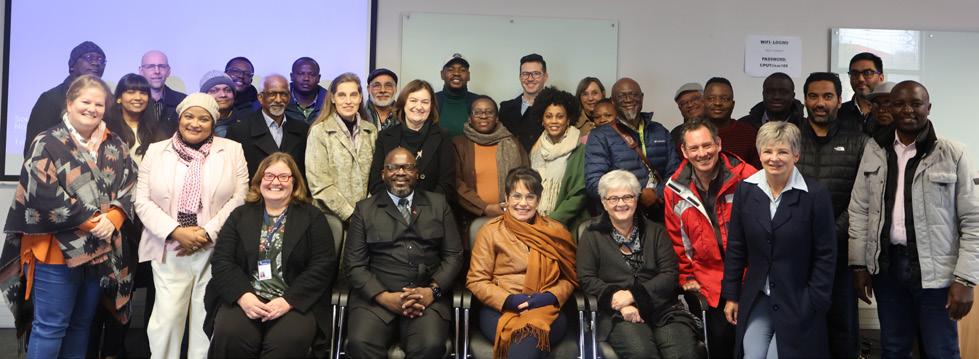
The Principals’ Breakfast – featuring community leaders, the WCED Council chairperson, and the deputy chairperson – is a key strategic engagement for our institution.
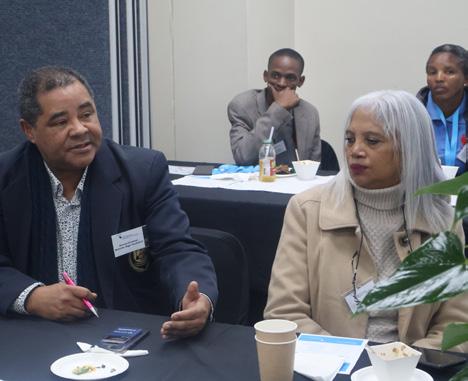
UWC and CPUT Vice-Chancellors’ Engagement: UWC and CPUT have a rich history of collaboration aimed at achieving common objectives in higher education. Annually, the vice-chancellors of both institutions convene to discuss strategic matters of mutual interest. This year, they solidified their collaboration by signing a Memorandum of Understanding (MoU).
MTN NEXTGEN STEM: This initiative by the MTN Group targets female students in STEM fields, and is managed by the Office of the Vice-Chancellor. Launched in 2023, this one-year programme caters to graduates and finalyear students, offering exposure to a male-dominated work environment. The initiative aims to reduce the gender gap in STEM industries.
The VC’s Humanitarian Assistance initiative quickly responds and supports distressed students. Currently, it assists unfunded students to curb hunger in the Institution by providing food vouchers, as well as dignity packs to female residences.
Social media
LinkedIn is the new addition to the family.
• Facebook – CPUT VC – https://www.facebook. com/CPUTVC
• X – @CPUT VC – https://x.com/cputvc
• LinkedIn – CPUT – https://www. linkedin.com/company/103650953/ admin/?lipi=urn%3Ali%3Apage%3Ad_flagship3_ feed%3BCSa4HU4FTemCzvDNbQeQPA%3D%3D
These platforms enable the Vice-Chancellor’s Office to highlight activities and initiatives, while clearly defining the purpose of each one.
Numerous keynote, guest, and welcome speeches by the Vice-Chancellor and Executive Director were recorded and posted on various social media platforms; here are some highlights.
• PwC 30th Annual Education Conference: The Vice-Chancellor, Prof Nhlapo joined fellow vicechancellors across the continent to discuss how to unlock Africa’s potential in higher education. Together, they shared insights and expertise on how to harness the power of education to drive Africa’s growth and development.
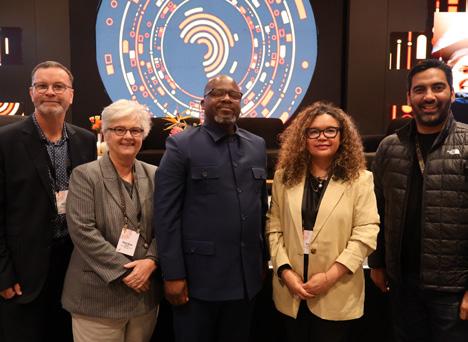
• 8th U6 Plus International Conference: The ViceChancellor hosted the conference for a week in September 2024. Distinguished vice-chancellors across the continent were present, and valuable insights on innovation for sustainable development and transformation in Africa were shared.

• 5th WIL AFRICA Conference: The Vice-Chancellor delivered a thought-provoking welcome address at the conference, which was held at Century City in Cape Town. Prof Nhlapo emphasised the significant role of technology in advancing work-integrated learning in Africa.
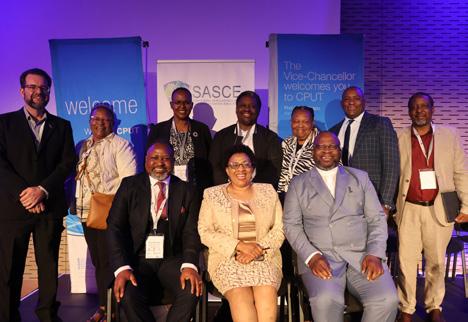
• Executive Director: Office of the Vice-Chancellor (ED: OVC), Prof Driekie Hay-Swemmer delivered a message of support at the Inaugural International Conference on Business Innovation and Incubation hosted by Business Incubation Web Association (BIWA) at Nelson Mandela University.
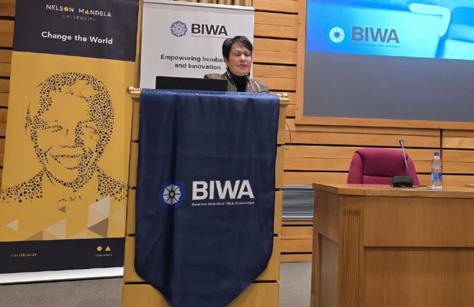
• South African – Sweden Universities Leadership Summit: The Vice-Chancellor was among the vice-chancellors’ delegation to Sweden, where he delivered an insightful paper on “Democratising Internationalisation of Higher Education in South Africa and beyond”.
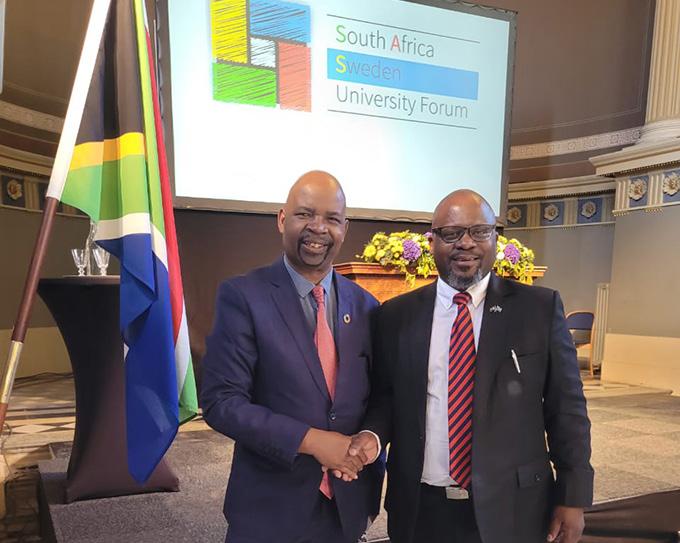
• SATREPS project handover: The Vice-Chancellor welcomed a delegation from the Science and Technology Research Partnership for Sustainable Development for the official handover ceremony of the pilot plant and analytical equipment donated by the Japan International Corporation.
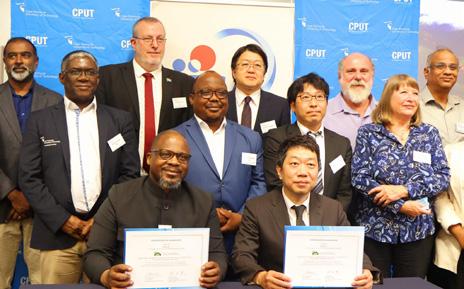
• DHIK and THENSA Colloquium: The ViceChancellor, as the Chairperson of THENSA, hosted the Germany University Consortium for International Cooperation Colloquium.
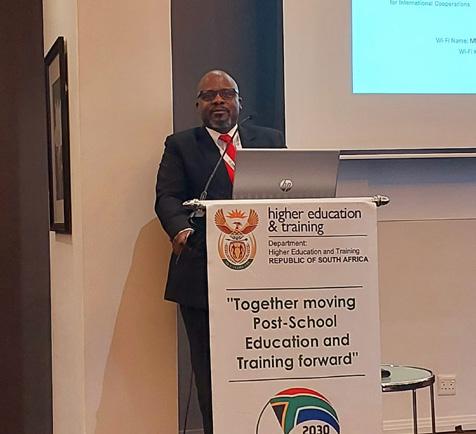
• F’SATI in France and a visit to Erasmus Brussel University: The Vice-Chancellor visited Erasmus Brussel University of Applied Sciences and Arts during the F`’SATI board meeting in France to finalise an MoU that was initiated when the Erasmus Brussel University visited our institution.

• Deputy Minister of Higher Education, Science, and Innovation, Honourable Buti Manamela, visited CPUT early in the year to monitor and observe the 2024 state of readiness.

Stakeholder Engagement Coordination is a continuous practice, featuring a new and exciting focus each year. Various appendices are available on request, such as the following:
• Stakeholder database
• Invitations and programmes
• Minutes or summary of each activity
• Attendance registers

Shanaaz Bailey Personal Assistant to the Vice-Chancellor
Personal Assistant to the Vice-Chancellor
Being appointed in the Office of the Vice-Chancellor is a considerable honour. One of my responsibilities as the Vice-Chancellor’s Personal Assistant is to serve as a central contact point between the Vice-Chancellor and various internal and external stakeholders, ensuring effective and timely communication. Maintaining a professional image is important, as the Office often engages with high-level visitors.
The Vice-Chancellor’s Office is a complex space, and demands excellent organisation and attention to detail. Indeed, the Office is busy, with no two days alike. Some days, unforeseen emergencies can disrupt the Office’s agenda, requiring quick thinking.
I am grateful to all staff for respecting the Office of the Vice-Chancellor, for being collegial, and supporting my development in my role as Personal Assistant.

Abbreviations/Acronyms
AI Artificial intelligence
AROC Audit and Risk Oversight Committee (of Council)
ASEZ Atlantis Special Economic Zone
AY Academic year
BAT Business Acceptance Testing
BCM Business Continuity Management
CAF Combined Assurance Framework
CDISC Centre for Diversity, Inclusivity, and Social Change
CHE Council on Higher Education
CMF Compliance Management Function
CPGS Centre for Postgraduate Studies
CPUT Cape Peninsula University of Technology
CTS Computer and Telecommunication Services (Department)
DHET Department of Higher Education and Training
Doc QIP Doctoral Review Quality Improvement Plan
DQIP Departmental Quality Plan
DSA Division of Student Affairs
DVC Deputy Vice-Chancellor
ECSA Engineering Council of South Africa
ED Executive Director
EM Executive Management
ERA Ethics Risk Assessment
ERM Enterprise Risk Management
ESG Environmental, Social, and Governance
FAS Faculty of Applied Sciences
FBMS Faculty of Business and Management Sciences
FEBE Faculty of Engineering and the Built Environment
FEd Faculty of Education
FHWS Faculty of Health and Wellness Sciences
FID Faculty of Informatics and Design
FYE First-Year Experience
GBV Gender-based violence
HC Human Capital (Department)
HE Higher education
HEI Higher education institution
HEMIS Higher Education Management Information System
HEQSF Higher Education Qualifications Sub-framework
HERS-SA Higher Education Resource Services South Africa
HoD Head of Department
HPCSA Health Professions Council of South Africa
IBCF Institutional Business Continuity Forum
ICAF Institutional Combined Assurance Forum
ICT Information and Communication Technology
IGBVC Institutional Gender-Based Violence Committee
IIA Institute of Internal Auditors
IPD Institutional Planning Directorate
IQF Institutional Quality Forum
IR Institutional Research
ISPC Institutional Strategic Planning Committee
IT Information Technology
KPI Key performance indicator
L&D Learning and Development
ManCom Management Committee
MCD Marketing and Communication Department
MIT Massachusetts Institute of Technology
MoU Memorandum of Understanding
MQA Mining Qualifications Authority
NQF National Qualifications Framework
NSP-GBVF National Strategic Plan on Gender-Based Violence and Femicide
OVC Office of the Vice-Chancellor
P-SET Post-school education and training
PA Personal Assistant
PG-SQD Postgraduate Student Quality Desk
PQM Programme and Qualification Mix
QAF Quality Assurance Framework
QARM Quality Assurance and Risk Management Committee
QMD Quality Management Directorate
QMPS Quality Management Practice Standards
RTIP Research, Technology Innovation, and Partnerships
SAAIR Southern African Association for Institutional Research
SAHRC South African Human Rights Commission
SANC South African Nursing Council
SAQA South African Qualifications Authority
SARETEC South African Renewable Energy Technology Centre
SDGs Sustainable Development Goals
SER Self-evaluation report
SETA Sector Education and Training Authority
SGBV Sexual and gender-based violence
SHE Safety, Health, and Environmental (Unit)
SIP Strategic Initiatives and Partnerships
SQD Student Quality Desk
SRC Student Representative Council
STEAMI Science, Technology, Engineering, Arts, Mathematics and Innovations
STEM Science, Technology, Engineering, Mathematics
ToRs Terms of Reference
UCT University of Cape Town
Unisa University of South Africa
UoT University of Technology
USAf Universities South Africa
UWC University of the Western Cape
V2030 Vision 2030 (CPUT Strategic Plan)
VC Vice-Chancellor
WIL Work-integrated learning
The Office of the Vice-Chancellor acknowledges all the staff working in the various divisions within the Office for their valued contributions to helping achieve the objectives listed in this Report, and the aspirations of the University.
Office of the Vice-Chancellor
Ms S Bailey, Personal Assistant to the Vice-Chancellor
Advancement Directorate
Mr C Maseko, Director: Advancement
Ms L Hendricks, Donor Researcher and Database Officer
Ms H Pietersen, Advancement Officer: Corporates, Trusts & Foundations
Mr F Jooste, Alumni Officer
Mr K Maphumulo, Advancement Officer: Government
Centre for Diversity, Inclusivity and Social Change Vacant, Acting Director: CDISC
Ms V Cornelius, Office Coordinator
Mr T Mfisa, Transformation Coordinator
Marketing and Communication Department
Dr G Van Gensen, Director: MCD
Ms S Koch, Secretary
Ms P Samuels, Secretary
Ms C Cloete, Public Relations & Events Officer
Mr D Stocken, Institutional Marketing & Branding Specialist
Mr C Christians, Web Editor
Ms M Marais, Senior Publications Officer
Ms M Cloete, Student Recruitment Officer
Mr G Barends, Student Recruitment Officer
Ms T Mtshekisa, Student Recruitment Officer
Ms L Kansley, Media Relations Officer
Ms I Fredericks, Communication Officer
Mr A Boyce, Communication Officer
Mr K Mitchell, Audio-Visual Technician
Mr C Mnisi, Audio-Visual Technician
Internal Audit
Ms H Van Dyk, Director: Internal Audit Enterprise
Compliance Management
Mr S Mtatase, Compliance Manager
Mr A Libala, Policy Analyst
Risk Management
Mr R Chibvongodze, Manager: Risk Management
Business Continuity and Disaster Recovery Directorate
Prof M Moll, Director: Business Continuity and Disaster Recovery Directorate
Institutional Planning Directorate
Vacant, Director: Institutional Planning Directorate
Ms Q Behardien, Office Secretary
Ms J Thomas, HEMIS Coordinator
Ms M Moller, Senior HEMIS Officer
Mr K Dyule, HEMIS Officer
Ms N Kuze, HEMIS Officer
Mr K Mbulawa, Academic Planning Officer
Ms D Richter, Institutional Research Officer
Quality Management Directorate
Dr S Makaula, Director: QMD
Ms R Weideman, Manager: Quality Reviews
Ms E Ansen, Institutional Quality Officer
Ms G Mhlauli, Senior Quality Officer
Ms E Stuurman, Secretary
Stakeholder Engagement Coordination
Ms B Luqhide, Stakeholder Engagement Coordinator
VISION 2030 - ONE SMART CPUT
In order for CPUT to become One Smart University, the following strategic focus areas were identified, and will steer CPUT towards 2030:
FOCUS AREA 1 | A Smart ITC environment and CTS workforce
FOCUS AREA 2 | Smart Teaching and Learning and Learning Environments
FOCUS AREA 3 | Smart RTIP that is relevant and excellent in its knowledge production
FOCUS AREA 4 | Smart Human Capital and Talent
FOCUS AREA 5 | Smart internationalisation
FOCUS AREA 6 | Smart engagement and strong links with quintuple helix partners
FOCUS AREA 7 | Smart student engagement and learning experiences
The notion of One Smart CPUT is designed in terms of two key dimensions that are in support of CPUT’s one smart university concept.
DIMENSION 1: ONENESS
The oneness dimension of V2030 is focused on our human-centricity through our smart people and the smart CPUT community that values and embraces unity (ubunye) in diversity (ukungafani).
DIMENSION 2: SMARTNESS
The smartness dimension of CPUT’s Strategy is focused on technological developments and innovations as considered by the current and future industrial revolutions.
+27 (0)21 959 6767 info@cput.ac.za www.cput.ac.za @cput @wearecput www.facebook.com/ cput.ac.za
